Labor day muddies the data a bit, but it seems that Alex Tabarrok was correct and the current wave has peaked. We could well be facing another peak in December due to seasonality. We might also have issues from schools, although as you’ll see later they’re taking extreme precautions and also we didn’t see any sign of a school effect last year.
The primary question now is how and if we return to normality. It’s no longer a question of when. We’re going to be dealing with a substantial amount of Covid for quite a while, and a large number of unvaccinated people for quite a while, and our lives are ending one minute at a time. Whatever we are going to do to return to normal life, we need to start doing it, and if we’re not doing it, accept that actually we are and whatever we are doing is now normal. Either reclaim your life and the things that bring you joy, or accept you’re not getting them back.
Note: This week’s post was written using LessWrong’s editor. Hopefully this solves the issue people were reporting with being unable to load images. Be quick to point out any remaining issues. I’m working on being able to paste Excel charts properly with the new tech stack.
Executive Summary
Top points this week:
- Covid case numbers peak.
- Australia’s dystopian nightmare deepens, hopefully we can avoid this.
- Schools are acting crazy in name of prevention.
Let’s run the numbers.
The Numbers
Predictions
Once again, I forgot about an upcoming holiday, in this case Labor Day, and its tendency to screw up reporting. I think it’s because holidays don’t seem ‘real’ to me as I’ve been working from home on my own schedule most of my life.
Prediction from last week: 1.1mm cases (+5%) and 11,150 deaths (+20%).
Result: 940k cases (-9%) and 10,272 deaths (+10%).
My guess is that the 10% drop on deaths is a reporting issue, and thus the cases also have a similar reporting issue and were about flat. This is still good news, but we shouldn’t expect a bigger drop next week or anything like that.
Prediction for next week: 940k cases (+0%) and 10,800 deaths (+5%).
Deaths

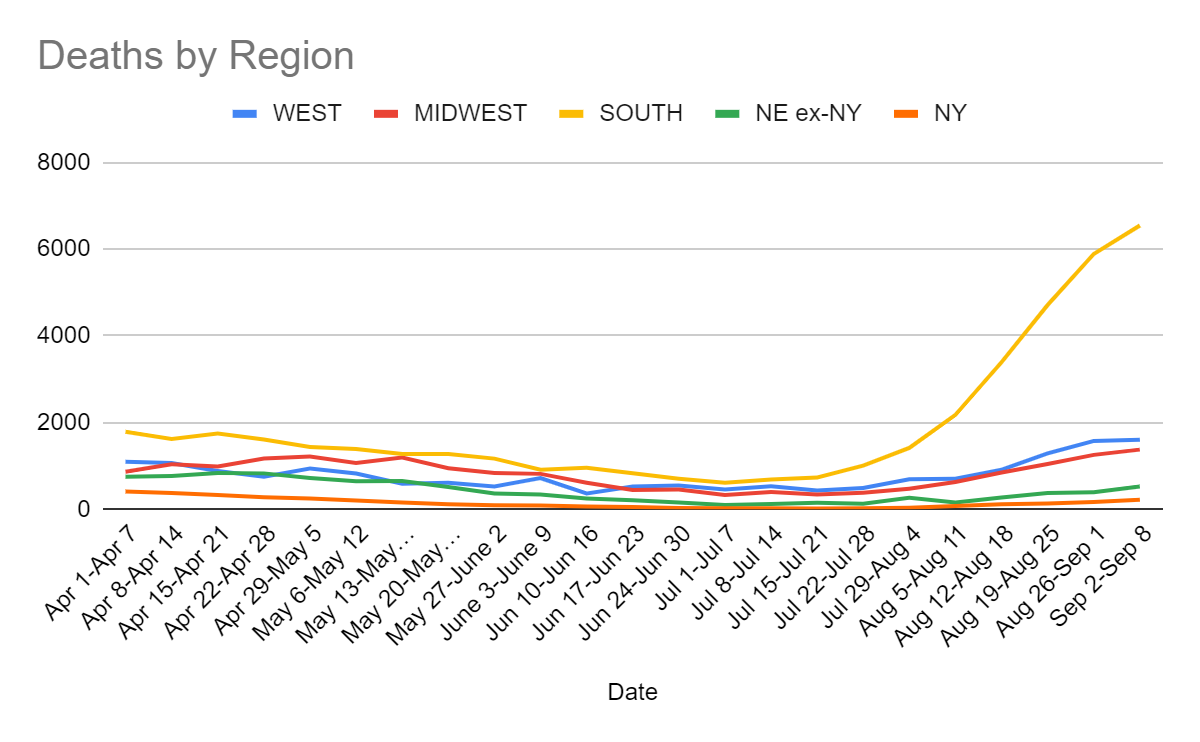
This is an excellent deaths number, but the difference from my prediction is likely the result of Labor Day rather than less people dying. We’ll find out next week.
Cases

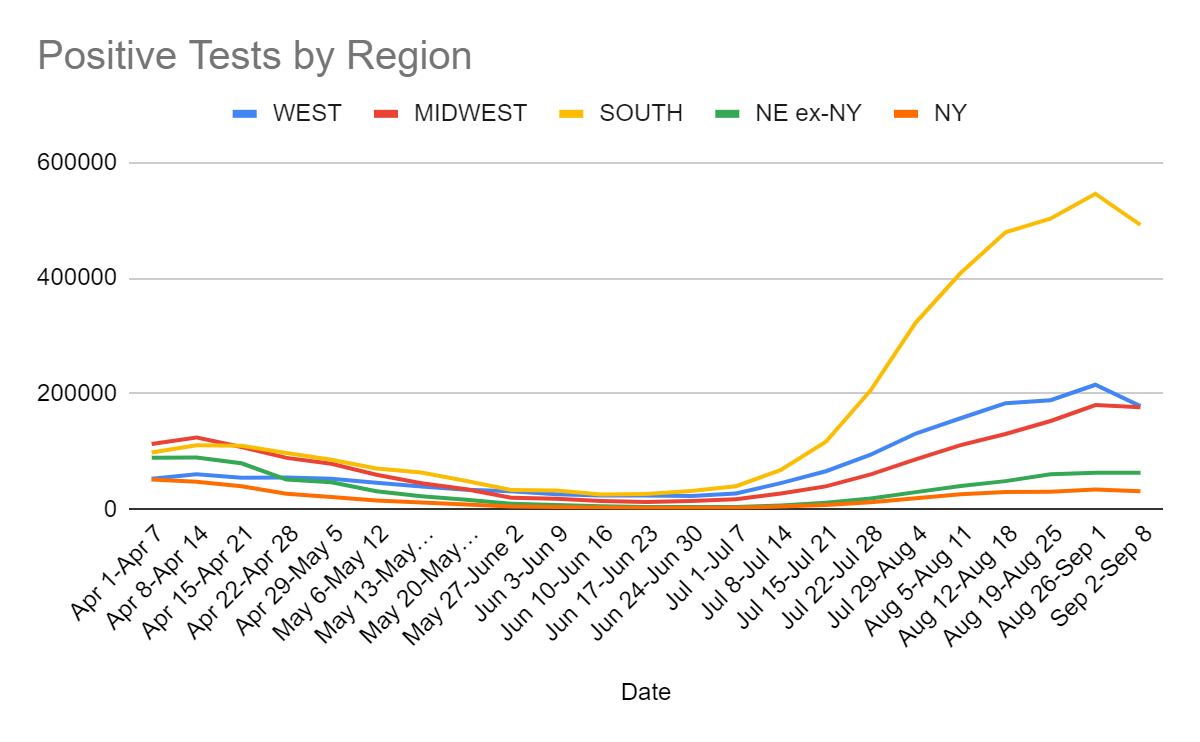
Was this the peak? I think it likely was a peak, whether or not there’s another coming in several months. The question is how much of this was a holiday reporting/testing issue versus a real decline, which always creates more uncertainty in the following week.
The Johns Hopkins data confirms this. The share of positive tests is down from peak, which makes me confident the true peak has come and gone.
Vaccinations
How much did full FDA approval matter? This is one measure.

That might not sound like much but the answers to this question have been highly stable over time, so it’s a big deal.
I don’t think you can quite do this calculation…
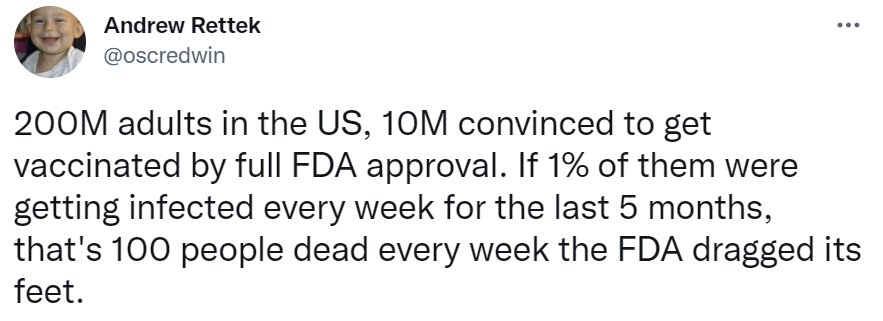
Then again, you also kind of can do a version of that calculation. Ten million adults went from unwilling to vaccinate to willing. That doesn’t mean they run out and get it overnight, but if we assume their behavior shifts into the group they now place themselves in, a lot of them will now get the shot with substantial probability each week. I expected it to be high given the assumptions I assumed were being made, but a hundred dead people per week seems to be a good Fermi estimate.
About the distribution of our surplus vaccines, yeah, we might want to get on that.

Thailand develops robot to get 20% more doses out of vaccine vials. Presumably this will mostly be ignored.
Today’s edition of ‘this, but unironically’:
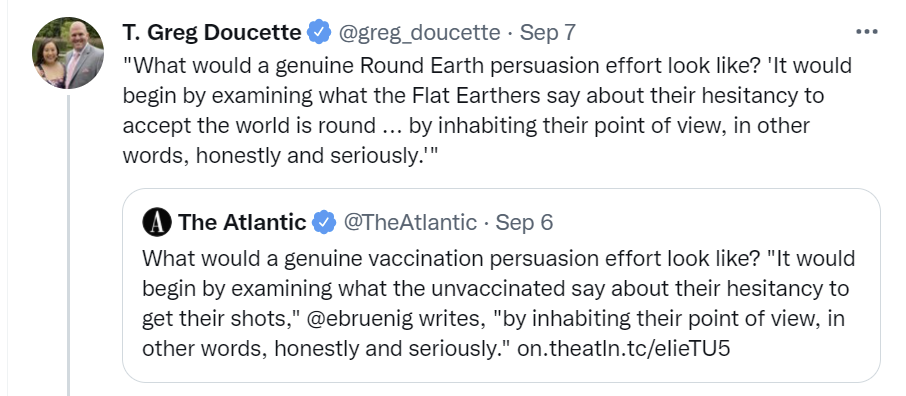
If I was trying to convince someone that the Earth was not flat, as opposed to being smug and angry about them not believing it was round, yes, I’d actually want to understand their reasoning and respond to their true rejections. What would be the alternative? Act smug and remind them how stupid they are being and how I have a lot of social proof until they give up? If that would work it would have worked already.
The point though is to know the actual reasons. When we find out some of those reasons are really stupid, though, we shouldn’t flinch from that.
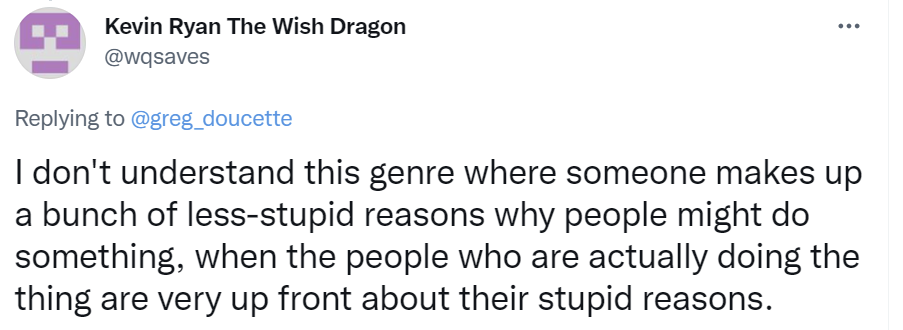
Vaccine Effectiveness
Another study has come out showing vaccines greatly reduce spread of Covid even when someone is infected. Link to study here.

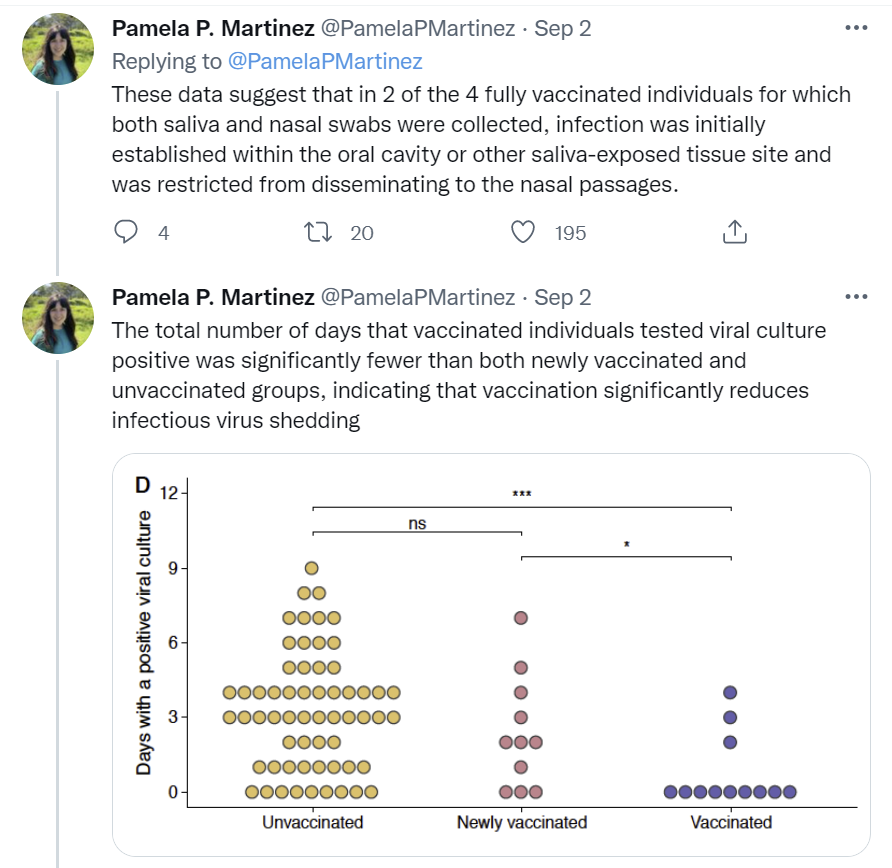
Statistics like this remain the most puzzling thing about the whole situation (study).

I’d quibble a bit with how they describe their results, but either way that’s quite a lot of antibodies. They say 20.2% of the population has antibodies from infection and the rest are from vaccination, which presumably is the result of giving vaccination full credit for all the antibodies of anyone who was vaccinated. Reinfections are currently thought to be extremely rare, vaccines clearly still work, and this is saying roughly half of the unvaccinated had a previous infection (with sustained antibodies) by May. The calculations can still work, especially if you presume that very little effective non-vaccine prevention is still going on.
This post goes over how effective the vaccines are. Mostly it’s good information and not far from my estimates, but it’s important to emphasize that no, we didn’t all know all along that vaccine effectiveness against mild but not serious illness would fade over time in about this way. I don’t even think we should be confident in that finding now. This is not a case of people ‘sending the wrong message’ or anything like that. This is a case of finding out something that was plausible but not expected, and then retconning to claim it was knowable and known beforehand. It wasn’t, and the line ‘of course it was always going to be like this’ is being used as a bludgeon in the hopes it will get everyone to meekly accept the new official facts – they’d rather pretend to have been lying because everyone knows they lie all the time already, I suppose.
If we develop new vaccines, or new versions of vaccines, how will we know if and how well they work? It is increasingly plausible we won’t, because the ‘ethics’ people and the logistics and regulatory departments will combine to prevent any useful studies from being run unless something changes. We need the ability to run comparison studies and we don’t currently have it.
You know what’s bad for your fertility? Covid-19. The latest data point on that is that getting Covid doubled the rate of stillbirths in Mississippi for the unvaccinated.
FDA Delenda Est
I could call this section ‘booster shots’ but at this point the alternative title seemed more appropriate. The FDA is determined to prevent booster shots. Several officials resigned last week over this issue, and the remainder are holding firm that one does not simply get a booster shot, one must get proper approvals through proper channels after the appropriate delays, and if you don’t ensure the delays are proper you are not following the science.
How is the FDA doing that? Didn’t the FDA promise quick and painless review for vaccine revisions and booster shots? Doesn’t mRNA provide the ability to update quickly, within days or at most weeks?
Oh, that won’t be a problem, all you have to do is apply standard procedure. Most people in the United States aren’t even legally allowed to be told what strain they were infected by because that requires extra approvals so cumbersome no one will ever get them, you think we’re going to let them get fully vaccinated that easily?


Mostly you should feel lucky we let you get vaccinated at all.
One tactic, once you’re temporarily done accusing people in charge of making decisions with ‘playing politics,’ is to ask explicitly political questions completely outside the FDA’s purview, because if you’re a veto point you get to decide why you want to veto.
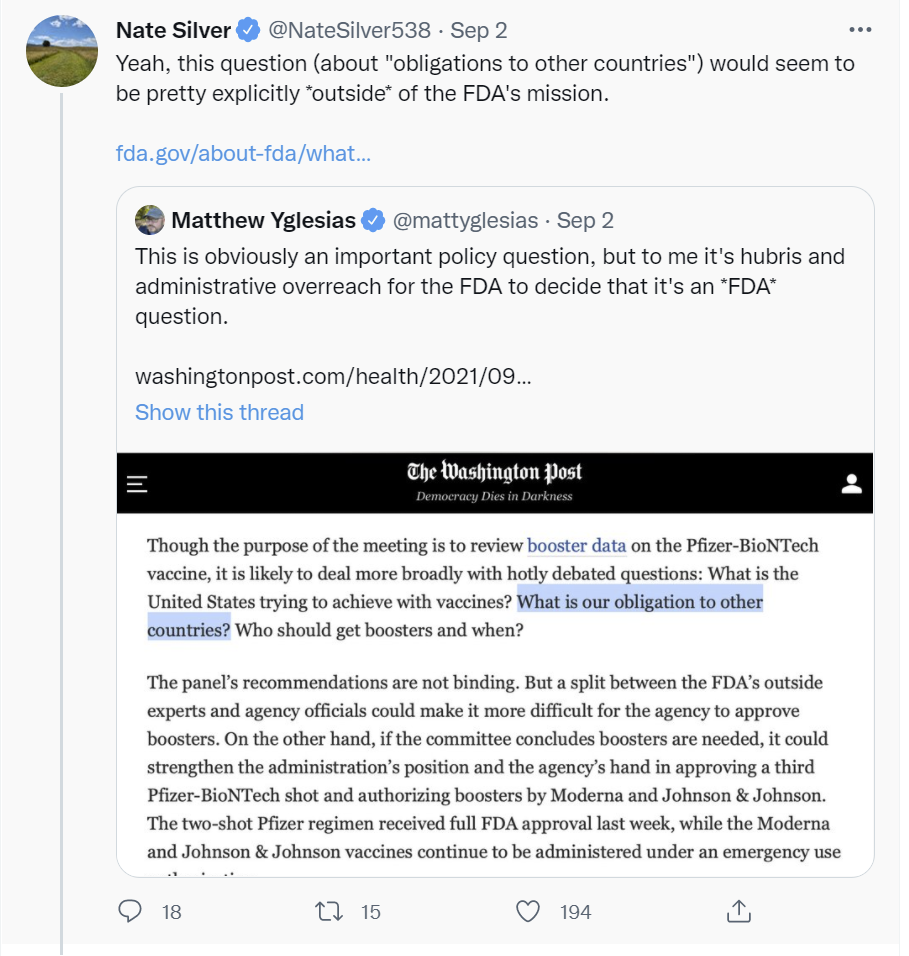
You don’t need that though, as MR notes you can simply say no.
Top federal health officials have told the White House to scale back a plan to offer coronavirus booster shots to the general public later this month, saying that regulators need more time to collect and review all the necessary data, according to people familiar with the discussion.
Dr. Janet Woodcock, the acting commissioner of the Food and Drug Administration, and Dr. Rochelle P. Walensky, who heads the Centers for Disease Control and Prevention, warned the White House on Thursday that their agencies may be able to determine in the coming weeks whether to recommend boosters only for recipients of the Pfizer-BioNTech vaccine — and possibly just some of them to start.
What’s wrong with the Moderna booster application that they’re holding up for months?
Moderna wants to do boosters half the dose of its original shots, because (1) the original doses were too high, (2) the higher doses are even less necessary when you’re triggering a secondary reaction and (3) I don’t know if anyone noticed but there’s a shortage of vaccine.

The FDA responded no, we won’t allow that and we’ll hold up the whole process on that basis, because (1) if you do half doses then there might be waste, which is not going to get less perverse or absurd if you read it again or think about it for longer, I mean wow, and (2) because the half doses might ’cause confusion.’ It seems measuring different doses is beyond our medical system’s capabilities, so we’d better insist on giving people doubled doses (that cause higher short term side effects) to prevent that ‘confusion.’
That. Is. Not. Science. This is something straight out of the CIA field sabotage manual, and should be treated as such. Burn the place to the ground. Salt the Earth.
The go to move, of course, is to ask for more data, but the “bioethics” people were on the scene to ensure that the previous trials weren’t extended, ensuring the option to demand data that takes arbitrarily long to gather, since without it there is ‘no compelling reason’ to require a booster shot, especially for J&J, where such a booster would be the same second dose everyone got in the first place and makes very little biological sense.
Eric Topol tried to convince such people that having had Covid should count as a dose of vaccine, since in terms of physical outcomes it totally does, and got nowhere. No matter the source, I appreciate the attempt.
The same issue is preventing revisiting initial doses, which were educated guesswork by various companies, and are now treated as Word of God, with no option for the good lord to change their mind on new evidence. Any sane world would run further experiments to find the right doses, but that is definitely right out.
Meanwhile, in Israel, power speaks truth and says to prepare for future boosters.
Another good note is that while the vaccines work well against Delta, a further mutation could change that, and updating the vaccines for Delta would help minimize that risk. That’s not how the FDA thinks, so crickets.
Vaccine Mandates
Biden to make it official and require vaccines for all federal workers.
The ACLU needs to change its name, since it seems to be taking an increasingly consistent set of anti-civil-liberties policy positions. It usually justifies this by saying that helping some preferred group of people is its new definition of civil liberties. Here they are on vaccinate mandates, as opposed to its previous position that coercion was bad actually.

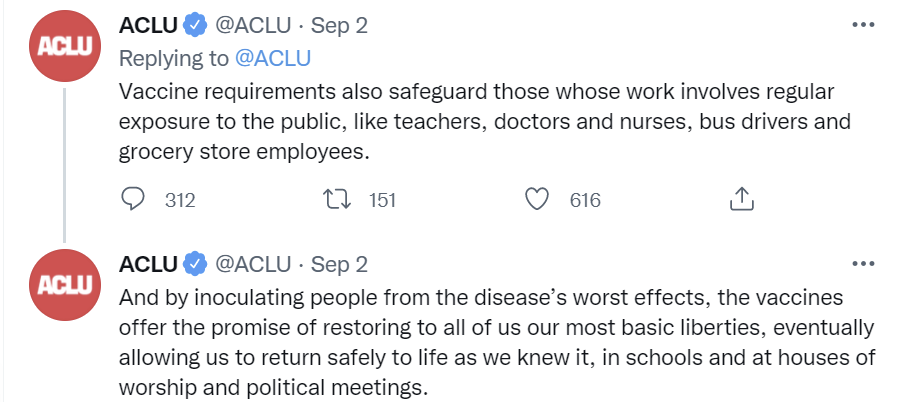
That is… not how civil liberties work. That’s not how any of this works. The ACLU’s entire job is supposed to be to stand up and say ‘no you can’t tell people what they must or can’t do, I don’t care how many people want to do exactly that, we are supposed to have civil liberties’ even when the correct response is ‘no obviously we need to do this thing because of this compelling government interest and actually we have the right to do so’ and when that case is strong enough they’re supposed to lose but keep fighting the good fight. Or alternatively, if they wanted to argue for allowing private mandates, they could make the case (as I do) that allowing freedom of association, and choice in when to associate with someone, is actually protecting civil liberties, but they’re not making that argument. They’re making the arguments that (1) forcing people to do this causes good things to happen so it’s good and (2) if we force people to do these things we would stop taking away people’s other basic liberties, not that we’re trying to stop that, what was the name of our organization again?
We could really use an American Civil Liberties Union. It’s a shame that we don’t have one.
Vaccine mandates for NFL game attendance have broad support, especially among those who attend games, in the sense that they make people more interested in attending games far more than they make them less interested.
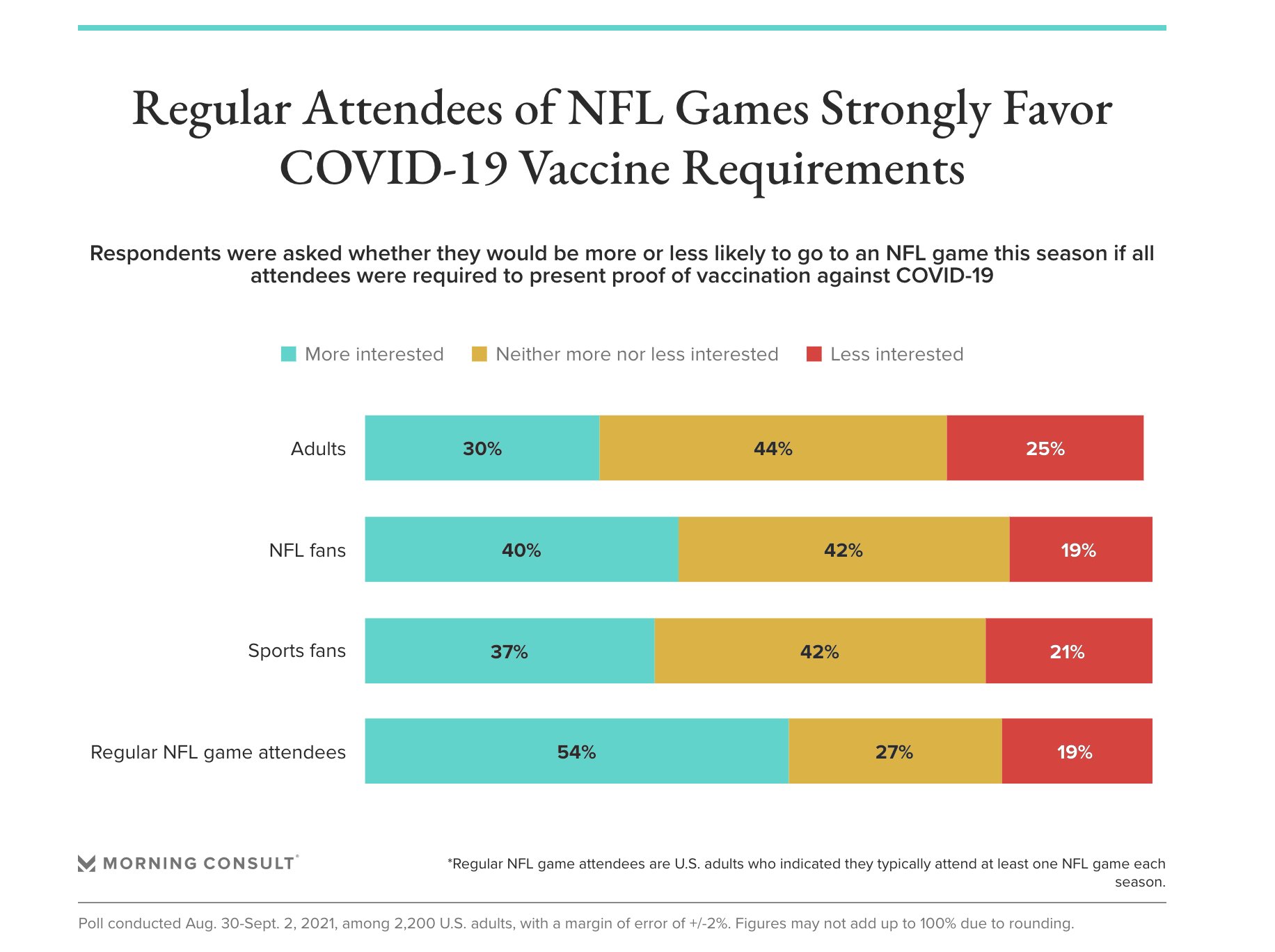
If you regularly attend games, and aren’t vaccinated, presumably a mandate makes you less interested, given you would not be allowed to attend. Thus, we can presume that NFL game attendees are mostly (>80%) vaccinated. And looking at all the numbers, it seems safe to say that among the vaccinated, requiring vaccination is very good for business. From what I’ve seen, this mostly extends to most other businesses as well.
Nate Silver did a highly virtuous thing, and laid out his views explicitly.
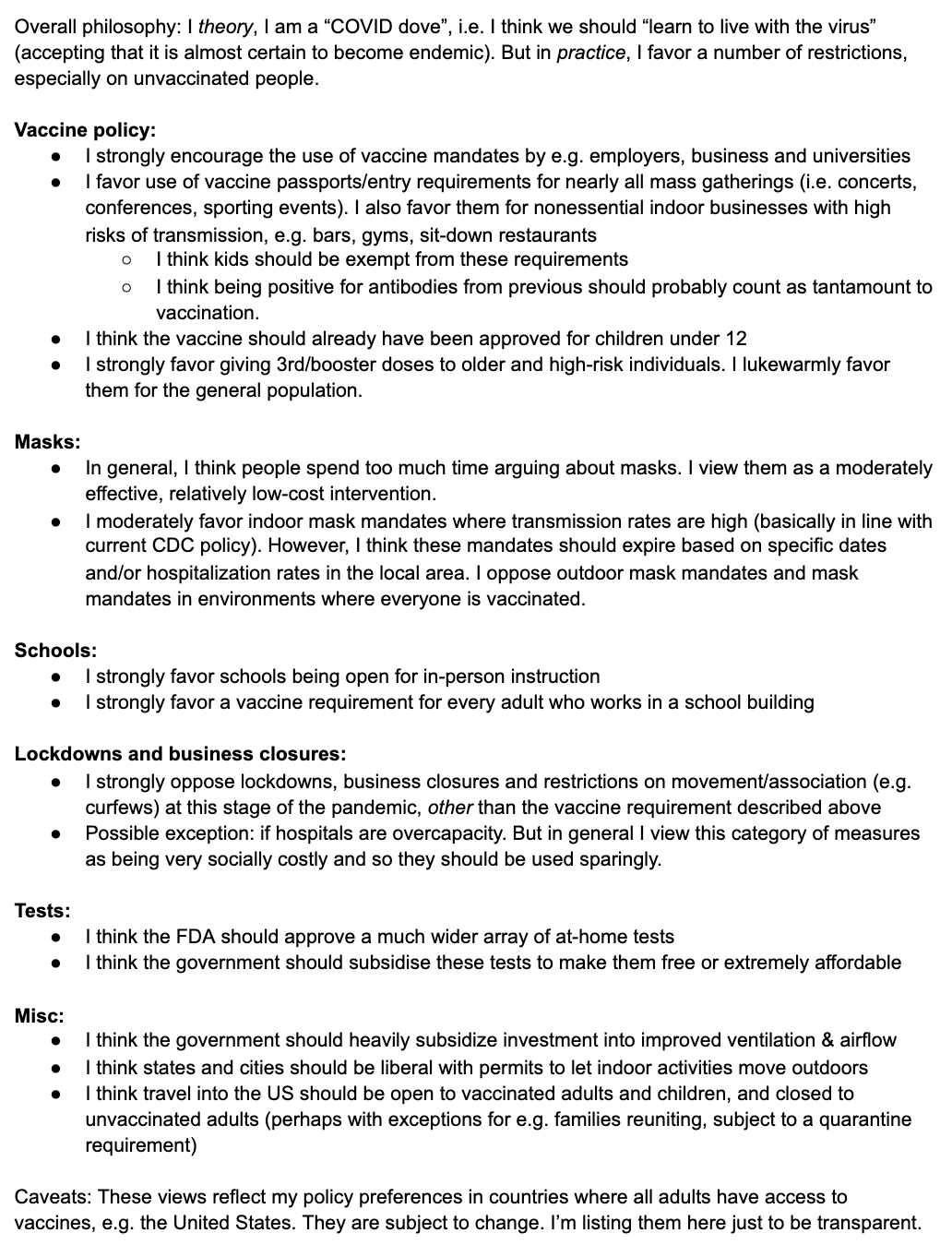
This would be even more virtuous if Nate’s views were more out there or less coherent. As it happens, I am very much in the same camp on pretty much everything on his list.
One important note is that if you are going to have a vaccine mandate, it’s important to let those impacted know as soon as possible, or you’re going to make the existing supply shortages that much worse. For example, New York school bus drivers, where there was already a shortage, and who absolutely should have a vaccine requirement and found out about this last week. Why is there a shortage? I’m guessing this attitude has something to do with it, and would suggest perhaps that if you want more people to do things like drive a bus around you should try paying them more money:
“This is a public service job,” Christopher said. “People don’t become bus drivers to get rich. They do it as a part time opportunity and many of them do it because they like kids, they want to help their school districts and communities. It is a community job that is important.”
NPIs Including Mask and Testing Mandates
Michael Mena tries one more time to explain the difference between rapid and PCR tests and what they are measuring. He’s been saying this for a long time over and over, I’m listing this because it seemed like an unusually clean explanation.
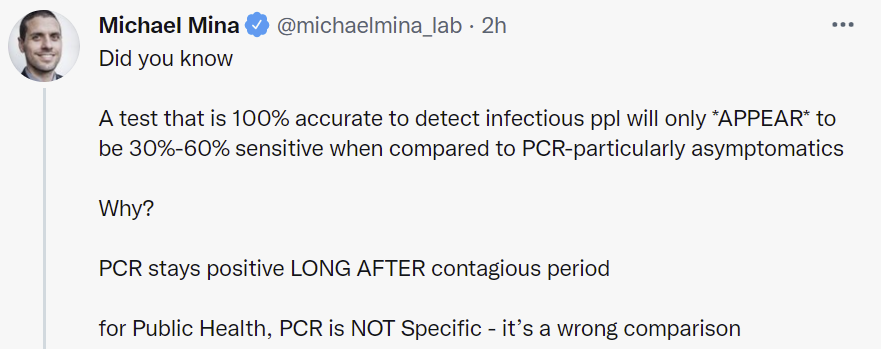




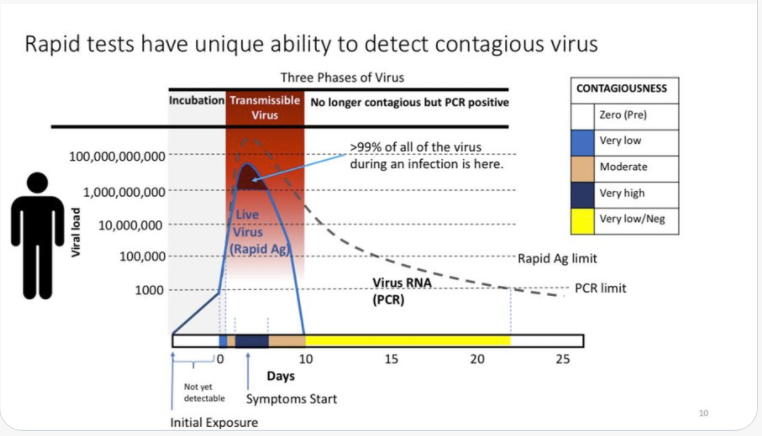
Alas, to the extent that we do contact tracing, quarantining or worrying about infection, we’re not looking at levels of infectiousness with this kind of attention to the physical world. Even people I know personally usually fall back on heuristics that make them feel comfortable, rather than doing what would be effective. Even now, much of the testing we do carries multi-day delays, which destroys much if not most of the value they provide. Whereas in some other places, such as Germany, tests are everywhere in droves, and either free or almost free, often using American-made tests.
Meanwhile, our “experts” continue to be maximally paranoid and conservative:
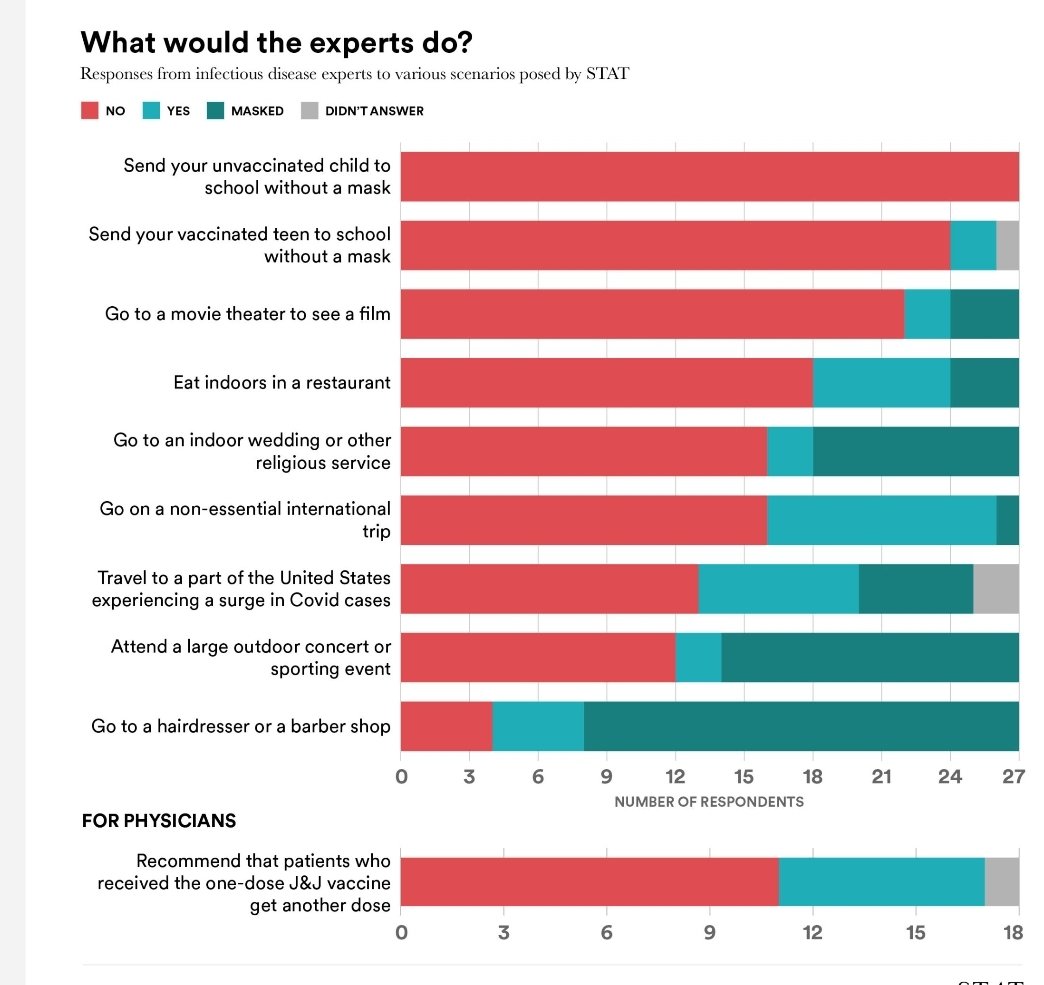
The last one is distinct from the others, and in many ways the most interesting. I have yet to see a coherent rationale for no-second-dose-for-J&J-but-two-for-everyone-else position, at all, yet I would be shocked if even one such physician told those who got Moderna or Pfizer to stop after one dose.
The ‘experts’ also don’t understand that their attitude towards risk is not normal, or that regular people think life matters, or that people can connect dots and draw conclusions based on those dots even when those dots are misplaced. Nate’s hypothesis is that many people are assuming that the ‘experts’ are saying sane things rather than insane things, and drawing the appropriate conclusions:
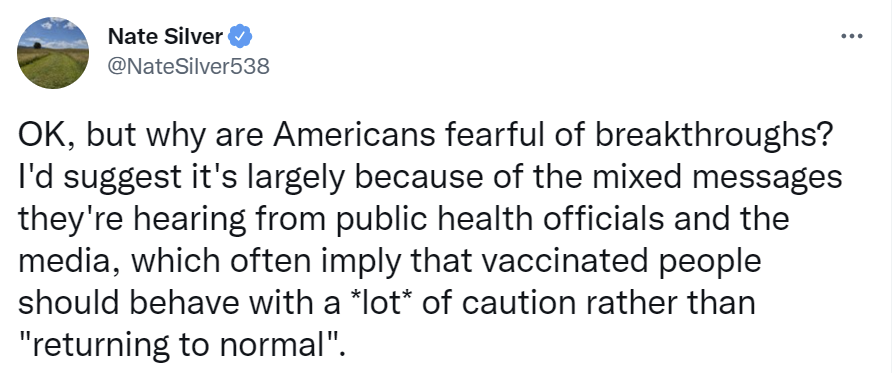


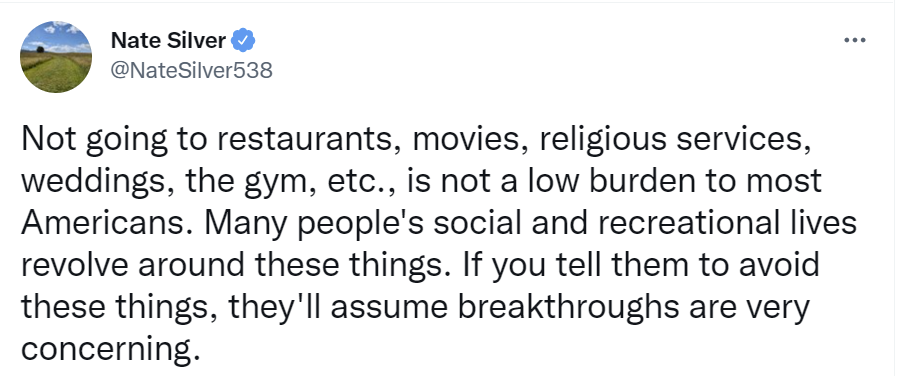
It is a very understandable mistake for ordinary Americans to largely presume that their experts are not acting crazy, but at some point it’s important to notice that such presumptions are wrong. And yes, I do think that the people who say ‘avoiding such things is a small cost’ or ‘you can do all that at home, and cheaper too’ are at minimum being rather clueless about how people live. Basically this kind of energy:
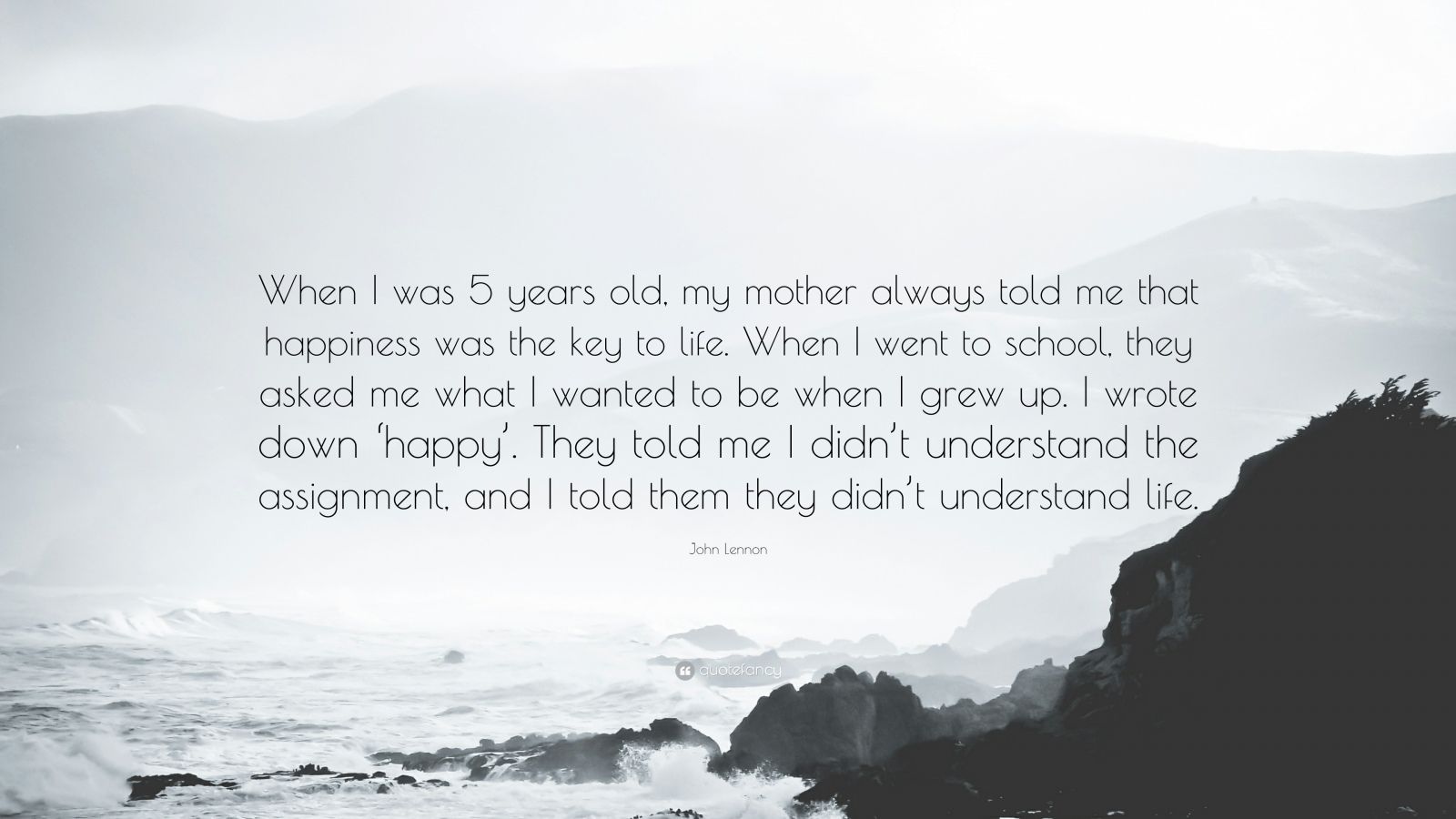
Of course, the teachers are correct, whichever child said this did not understand the assignment. The difference is that they saw this as a problem to be solved.
The Tragedy of Australia
Australia continues to prove that there are worse things you can choose over getting Covid. There’s a new article in The Atlantic detailing how far they’ve gone, and the answer is way way way too far. You can’t enter, you can’t leave the country, you can’t leave your house without an Official Approved Reason, all enforced by the military.
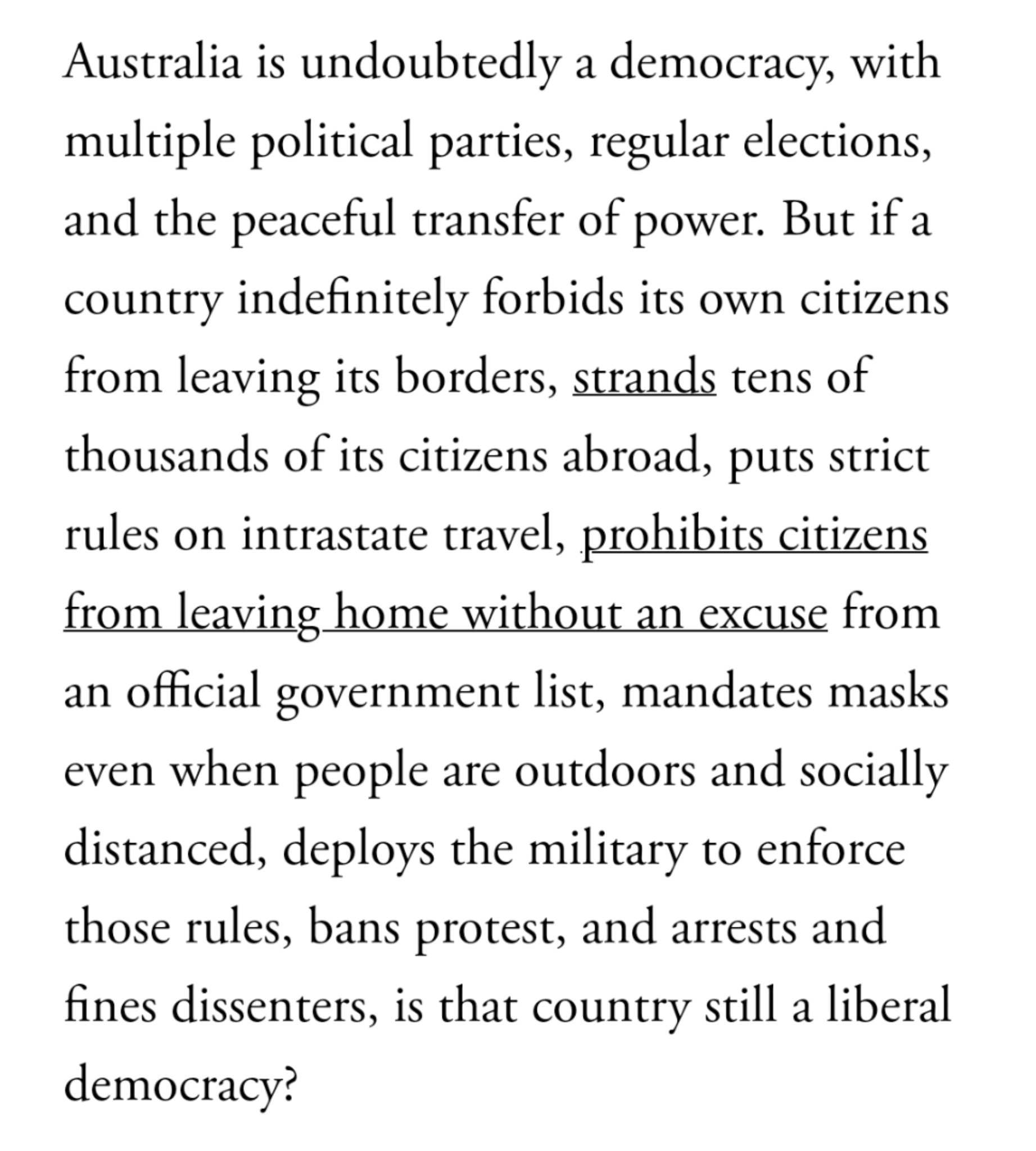
Australia’s way of life has been put on indefinite hold. What did they get in exchange?
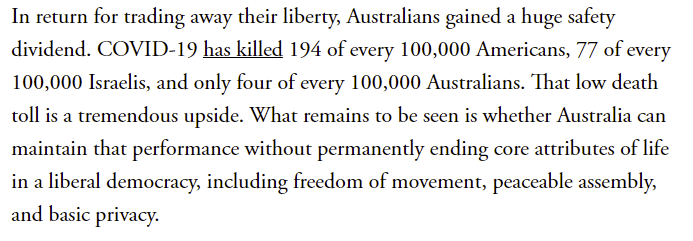
A year of house arrest to stop a 1 in 500 chance of death naively implies that the QALY value for a year under house arrest is at least 0.92 or so, and since Covid primarily kills the elderly that calculation is highly generous and it’s more like 0.96. Was it worth it?
More to the point, will it ever end? We’re getting mixed messages on that.
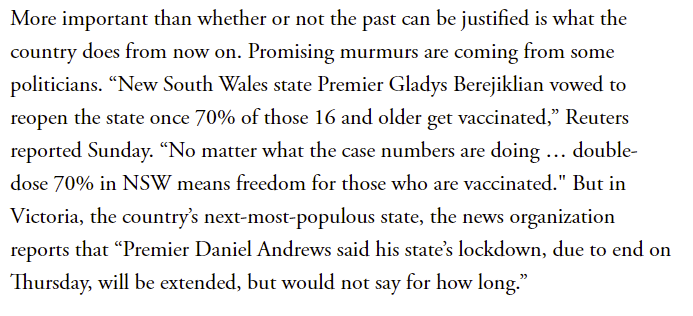
The calculation on having these types of controls in place, even for a period of months to a year, look terrible to me. If I had to choose between a year or more of this but no one gets Covid, or alternatively essentially everyone getting Covid before they’re vaccinated (over time, not actual everyone gets it at once and the hospitals crash), I’d choose essentially everyone getting Covid.
Meanwhile, Australian authorities have taken upon themselves full surveillance state powers, including the right to delete or modify social media posts during investigations (also known as ‘when they feel like it’) without informing anyone including the target. They can lock you out of your account, post new things, take down or modify other things, pose as you, and the only way you find out is when you can’t log in or notice the changes. So if you see a social media post or almost any other electronic communication by anyone in Australia, going forward, you cannot be confident that what you see is the communications of the person who you think owns the account, let alone that you are seeing all the things they intended to say, or that they will be the one who sees your reply.
Could it all happen here? What thanks do we owe the people, however frustrating and troublesome, that prevented something like this from happening so far?
Tyler Cowen explains why the defenses of Australia do not persuade him. He points out that Australia is not picking an efficient point on the safety versus liberty frontier, and making the best deal it can make. Instead, it is imposing these draconian restrictions and suspending normal life, while not doing basic cheap prevention or treatment including not pushing for rapid vaccination and not preparing for treatment. A series of email exchanges between Australia and Pfizer details now non-urgently they treated the problem.
I agree with that as an easy and conclusive rejection, but I don’t see it as the true rejection for two reasons. One is that one can point out huge, civilization-crippling mistakes but that doesn’t make actions conditional on those mistakes right or wrong if you assume that for whatever reason those mistakes can’t be fixed. This is far from a sufficient or general excuse, but that leads to the second and more important reason I don’t see this as the true rejection, which is that this isn’t necessary. If those additional interventions were impossible, would it change my view here? Not much.
Think of the Children
Consider the implicit assumptions here. Guidelines being commented on are here.
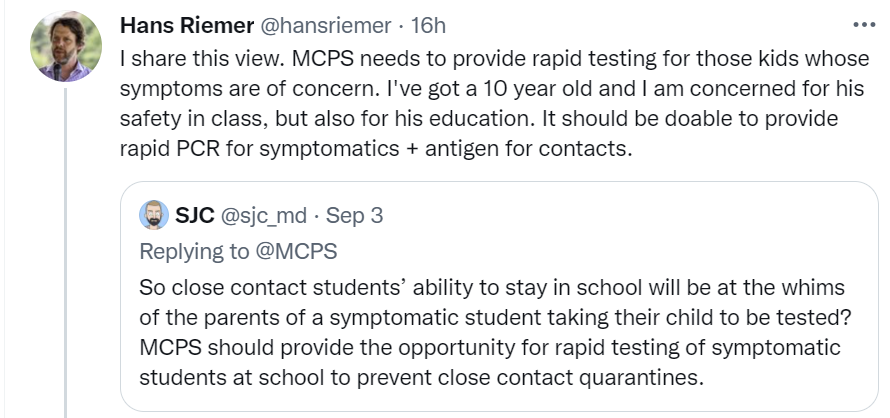
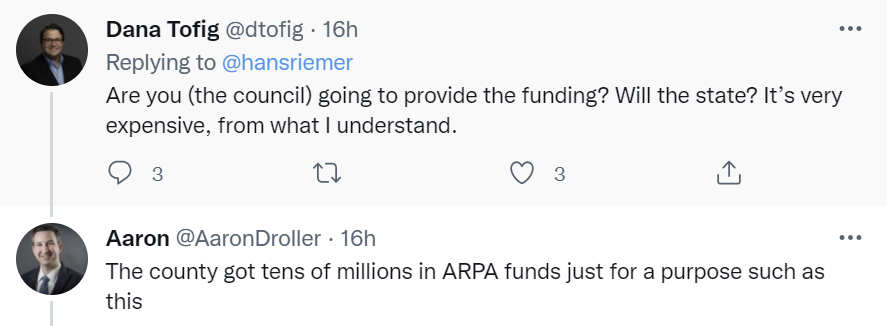
Lip service is being given to safety in class, but mostly parents are (correctly, if you believe school is good and important) viewing the problem as how to protect their children from being forced to quarantine. Testing your child isn’t a responsible thing to do, it’s an antisocial weapon because if the child tests positive it will require quarantines. The social pressure will actively be to prevent testing, at least in many cases, because the test has negative external value of information.
Still, if it does come to a quarantine, please do not threaten to zipline the principle. Although as we’ll see below, it will sometimes be tempting.
On the other hand, I’m not saying you should threaten to zipline anyone, but the rules are getting rather absurd in places. Imagine the reductio ad absurdum version, and then check this out.


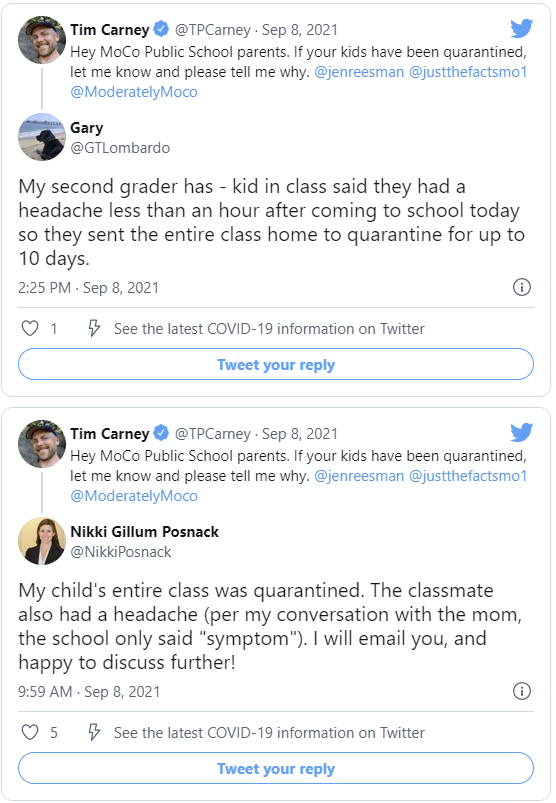
Yes, that means that if any child says they have essentially any symptom at all, you lose an entire classroom for a quarantine period.
If you think you can run a school where a single child in a classroom claiming to have a headache forces the entire class into quarantine, well, good luck with that, and please gather detailed data on what happens and hopefully turn it into a sitcom later. I’m imagining the game theory and social dynamics involved and they do not involve learning or preventing infections but they are delicious. Is a child even a favorite to be in school on a given day?
Meanwhile, Biden is calling upon all schools to institute regular testing, of asymptomatic kids, and yes our child’s preschool is doing this, requiring a test every week for every child, and it’s exactly as insane as it sounds.
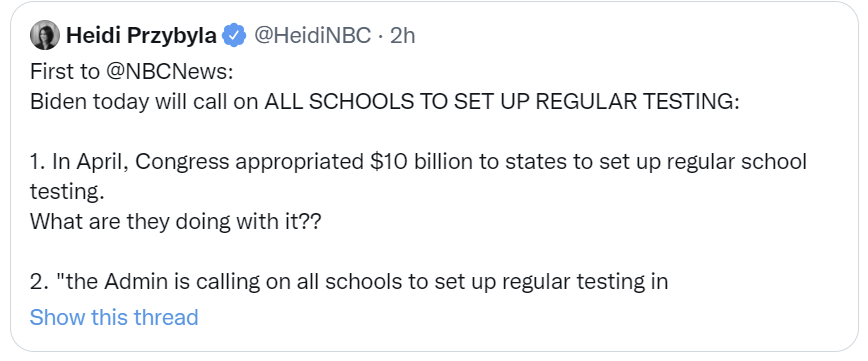
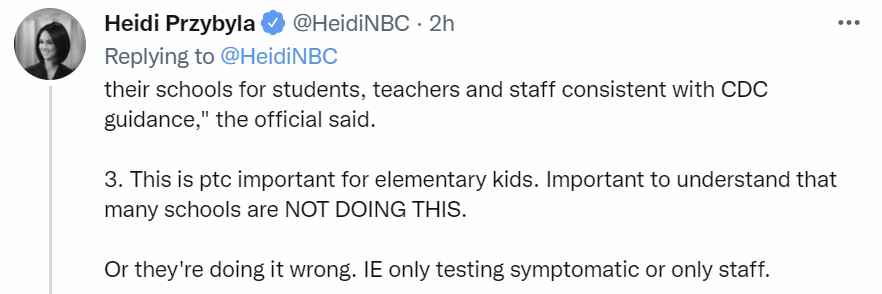
Is the point of childhood to prevent Covid? It seems like they’re acting as if the point of childhood is primarily to prevent Covid.
You’d think that by now, given all that, we’d have figured out reasonable things to tell someone who thinks they have Covid and is getting tested or has tested positive. Nope, definitely not here, sorry.
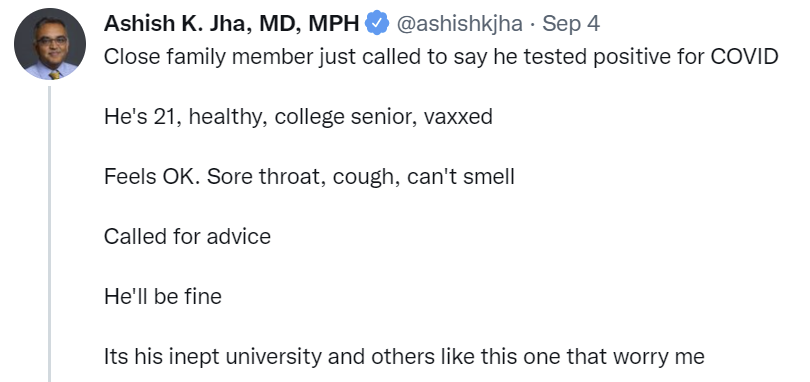
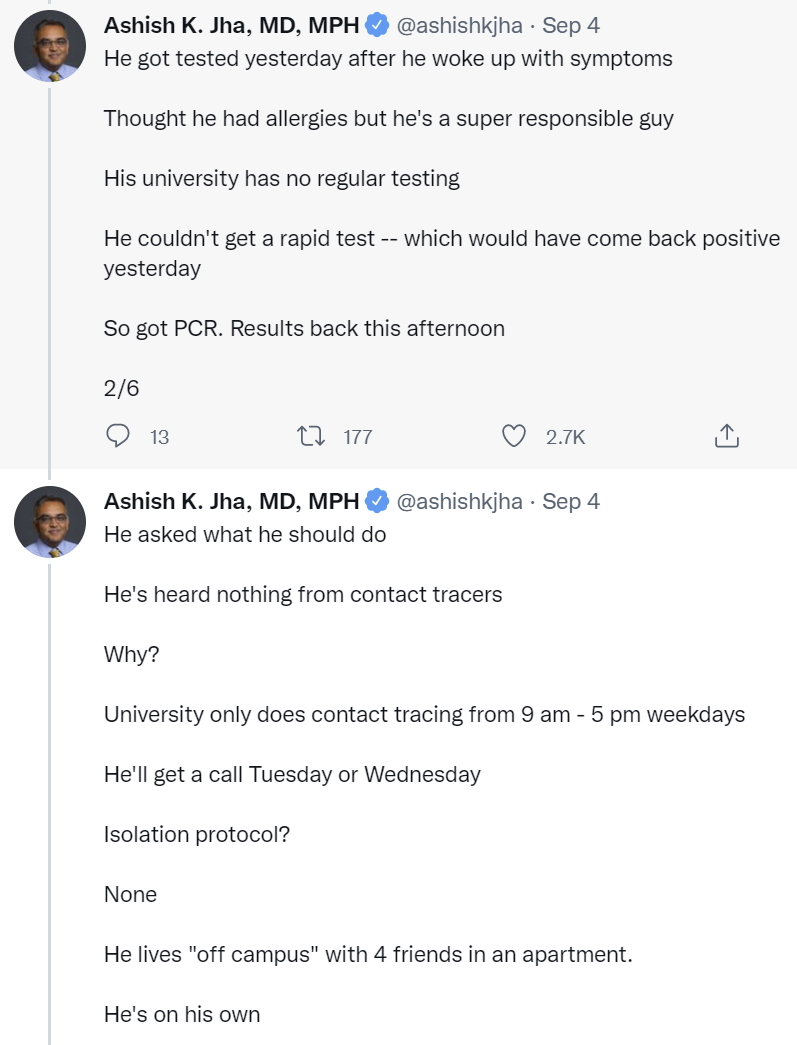
I will always be astounded the extent to which people think time stops if it does not happen to be 9am-5pm on a weekday. I will also be astounded of the extent that people think universities are supposed to be this special place where all this stuff is taken care of, how dare you ask college students to act like adults and handle their own lives, as opposed to the rest of the nation where (for example) contract tracing isn’t a thing at all and you’re supposed to take care of yourself. College really is a bizarre package of goods.
For an example of going completely off the rails in the other direction, may I suggest Connecticut College, where everyone is fully vaccinated. I don’t really know what anyone involved was expecting.

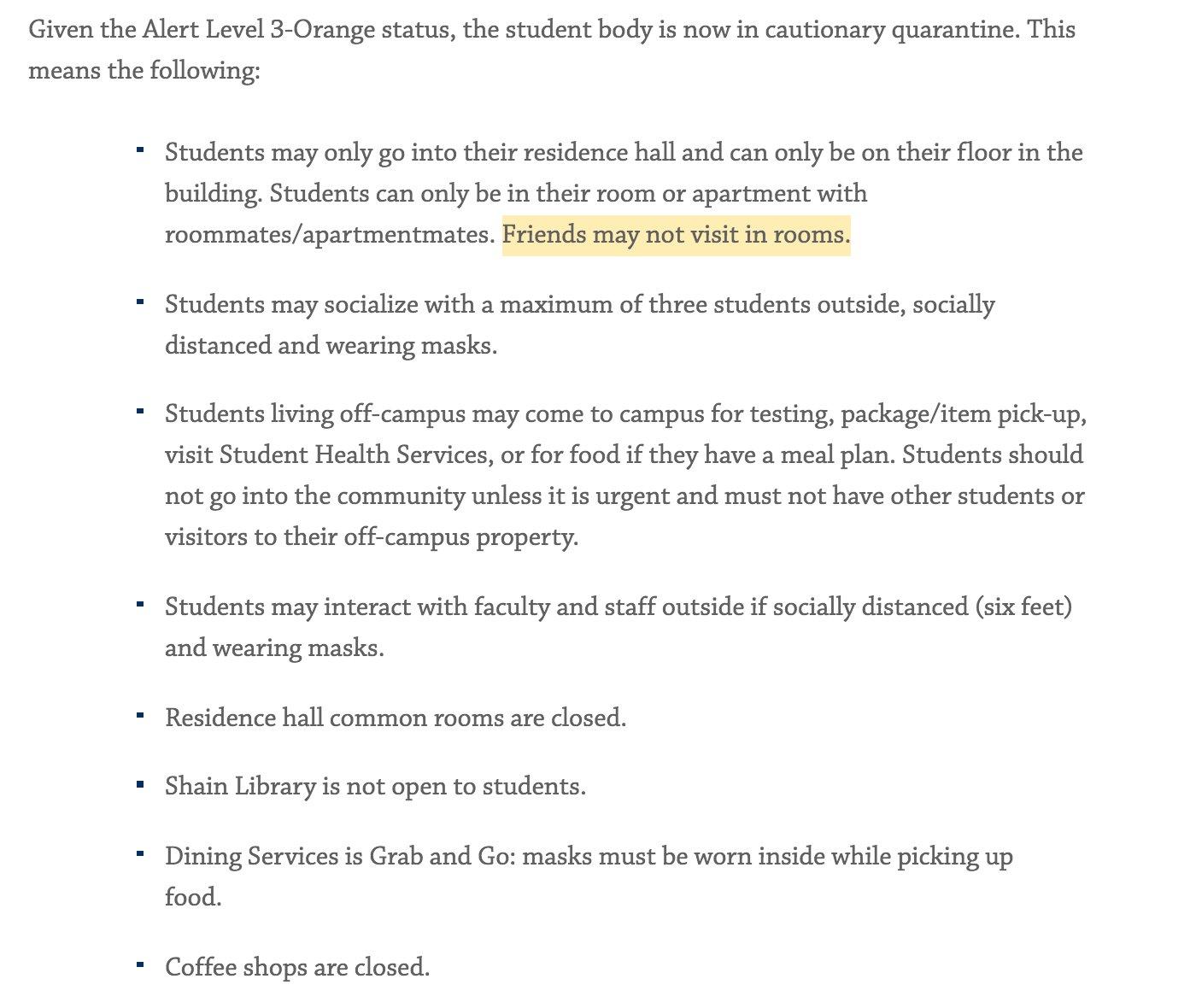
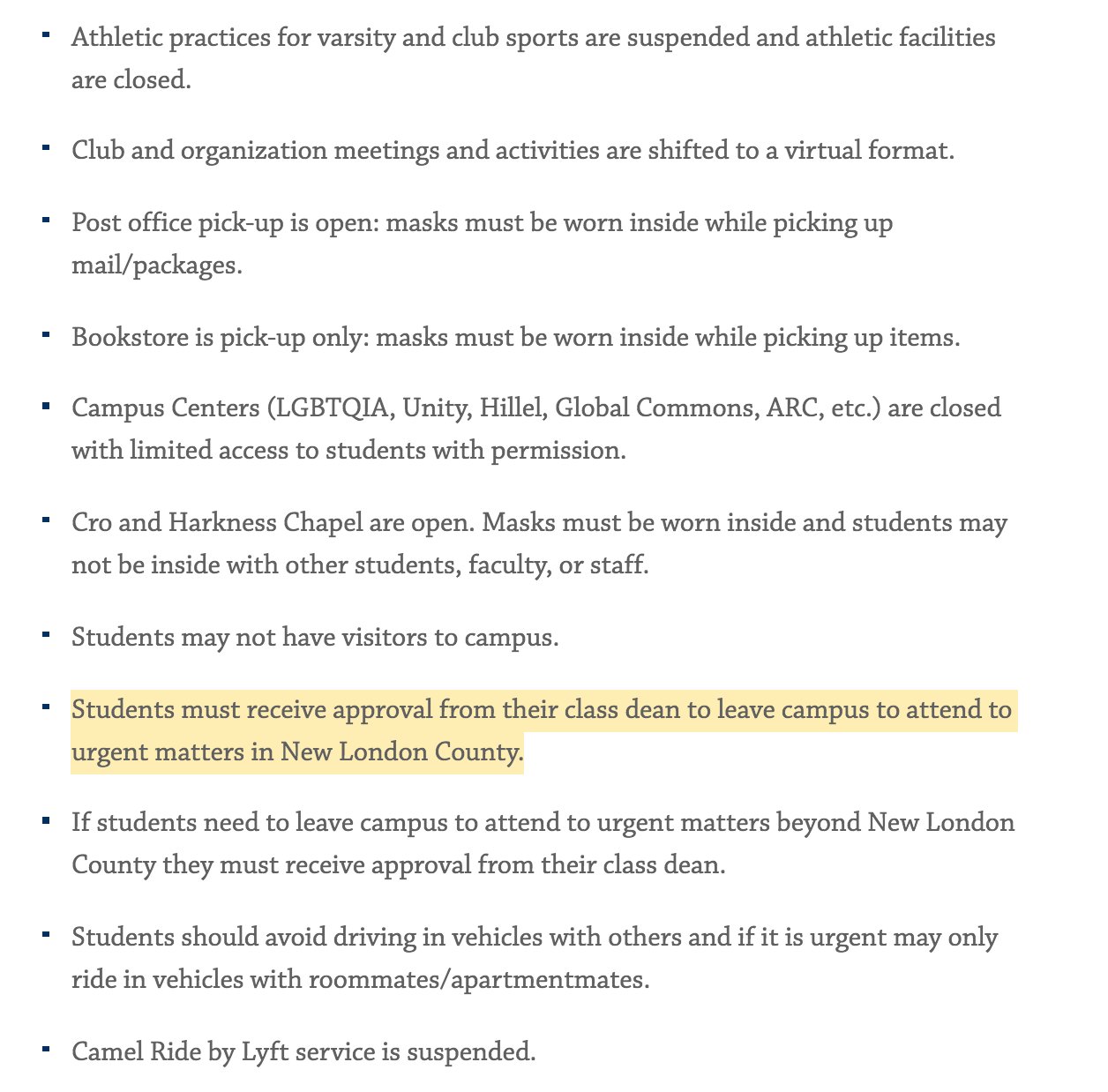
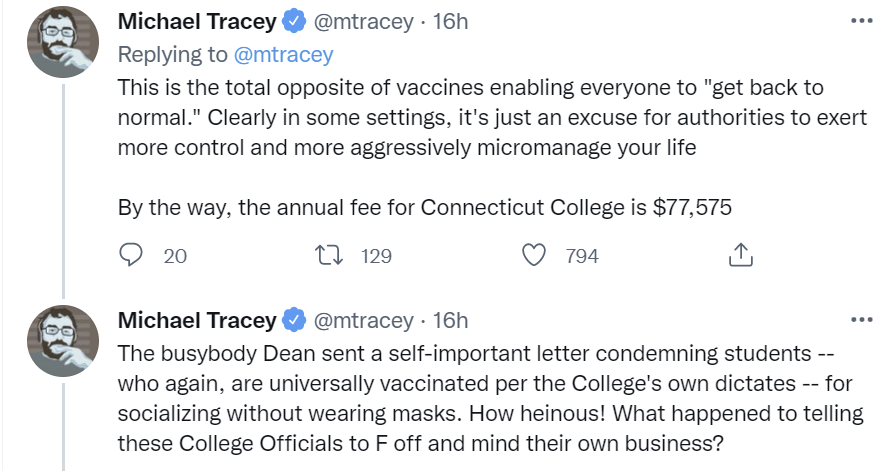

The most core error is here, in a classic case of one of these things is not like the others:
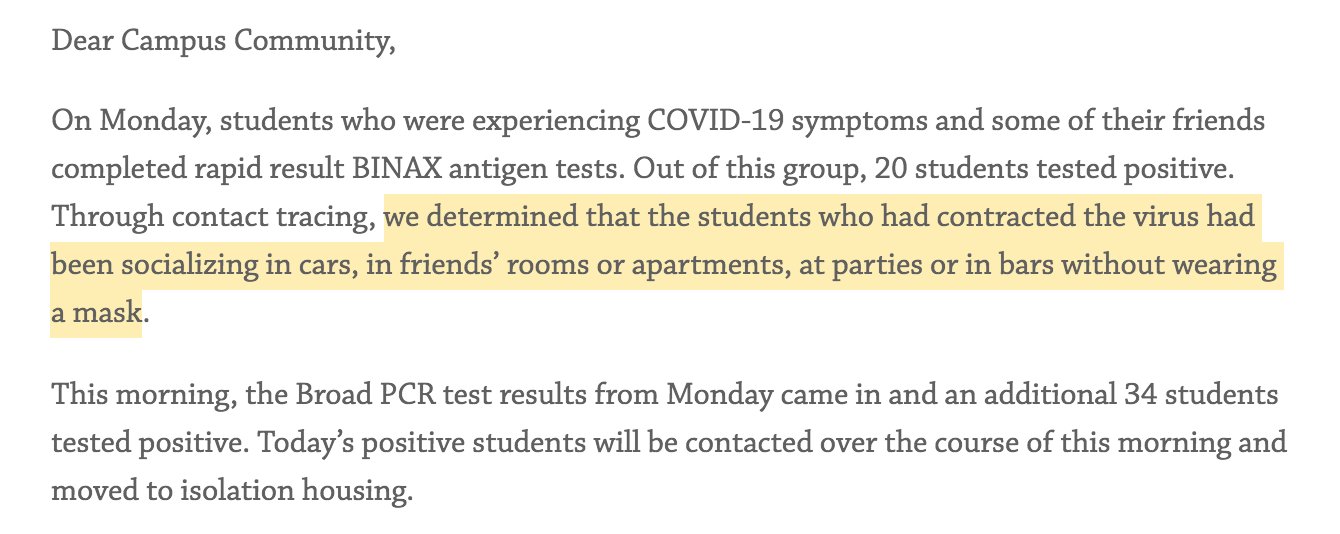
Worrying about students going to bars is highly reasonable. Worrying that they’re socializing in cars, friends’ rooms or apartments is different, but is being roped into the blame department. It’s also sending a clear message to students that the rules are about as worthy of respect as the rule that if they’re under 21 they shouldn’t drink.
Maybe We Should Try To Prevent Future Pandemics
Biden wants $65 billion for what he is calling a pandemic preparedness Apollo program. This is a great idea if it can be executed reasonably at all, even if only a small portion of funds end up going to this reasonable execution. The question is, can we execute, or are we too dead as players to do so? The first test is whether such a thing can pass at all even in the wake of a pandemic. The third test, if we get that far, will be to see if the money gets stolen (either outright through corruption and things that can’t possibly physically work, or reallocated) and the fourth test would be whether we then let even what we do build decay.
The fifth test, of course, would then be whether, if we had useful pandemic preparedness, would we be able to actually use it? Or would the FDA and CDC, combined with various partisan bickering, short term outlooks, accusations of racism and other such things, prevent us from deploying our tools even when we have them? Given what happened this time, this is not an idle question. We had our vaccines in a day, and could easily have known they worked within a month. So even if we did have a system that gave us our vaccines in a day and scaled them up in a week, would it even do anything useful?
You’ll note I skipped over the second test, which is to look at what’s in the actual proposal. Let’s take a look.
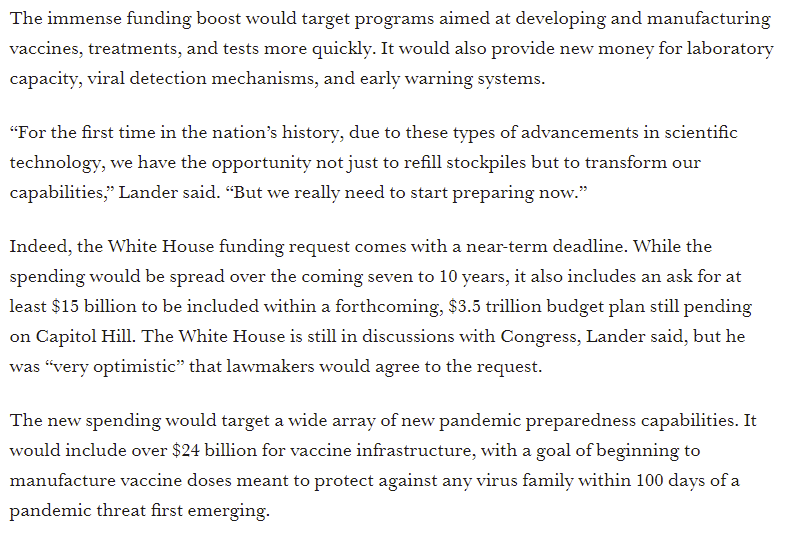
Sounds great when stated like that, but there’s an obvious problem, which is no plan to pass test number five. What good is having vaccines you’re not able to use?
Same problem with tests or treatments:

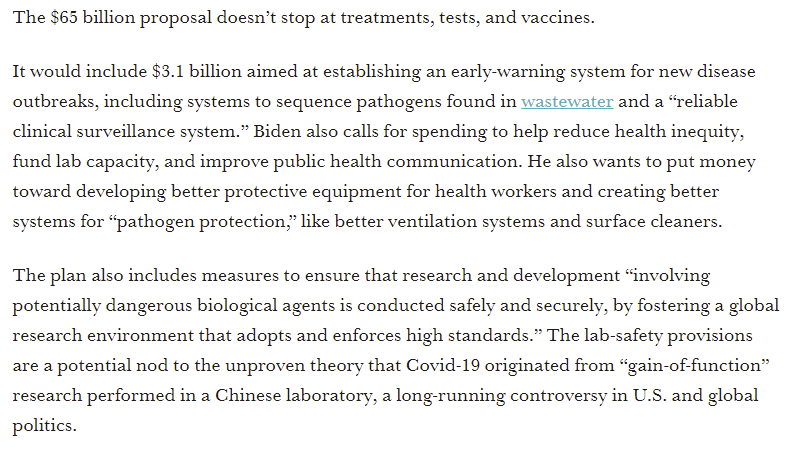
We can add a sixth test, I suppose, for ‘doesn’t fund a bunch of research likely to directly cause a pandemic’ and this reminds me a lot of the people who say the words “AI Safety” as if once you say the word Safety and decide that you’re going to take a Safe action instead of an Unsafe action – at some nonzero cost to you! – that suddenly hard part’s over and you’re Safe, as opposed to having no idea what an actually Safe action would actually be while some of us despair in the corner mumbling ‘none of this matters we are all going to die.’ Yes, I’d prefer to have some Lab Safety Measures instead of no such measures, but do you have any faith that they’ll be sufficient? Yeah, me neither.
Either way, to be very clear, trying to do this is very good, and it will be a good test of whether we can still be live players.
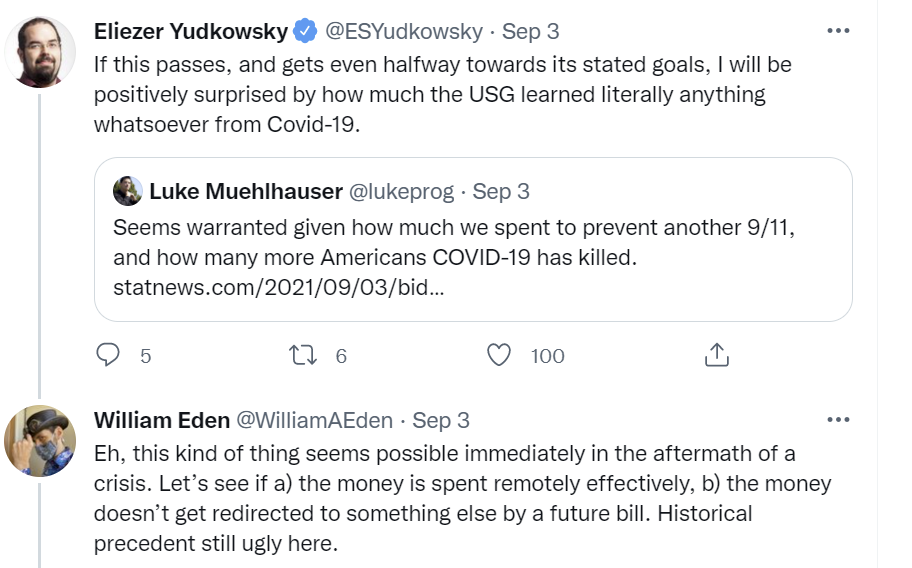
None of these concerns mean we shouldn’t do this. We should absolutely do everything we can, even if we expect the FDA and CDC are going to act next time around as if they want as many people as possible to die, and stall things as long as possible, because we’ll still be able to stop people from dying at least somewhat sooner and more effectively regardless, and who knows we might even do something to fix those problems.
Ivermectin
The media has not, shall we say, covered itself in glory when dealing with all things Ivermectin.
The poison control story turns out to be rather exaggerated.
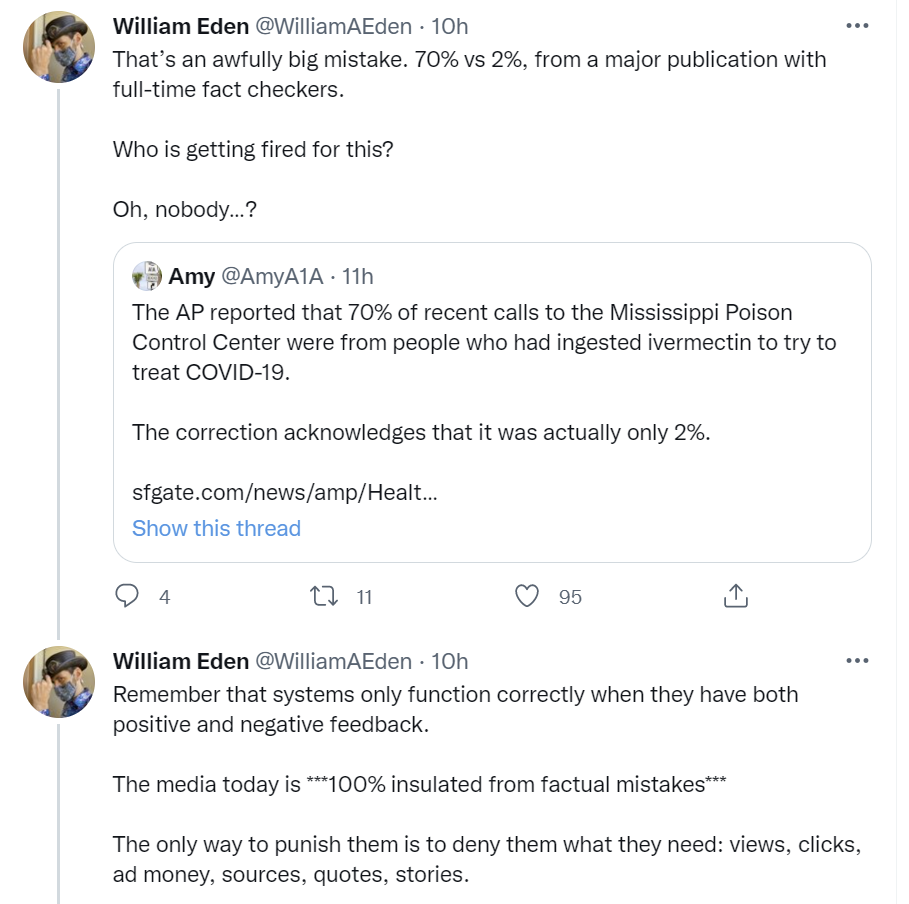
The mistake here, as per the correction Will links to, is very much not a good look.
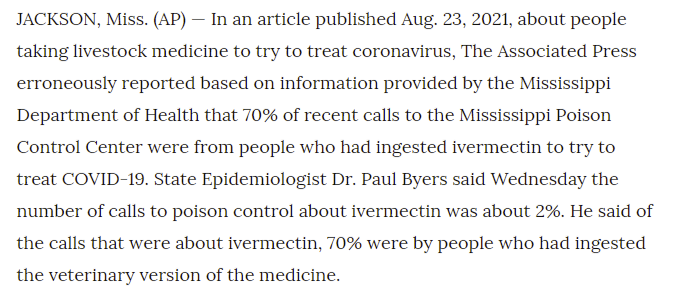
Someone really, really does need to be fired for this. This kind of error is very much Not Okay, and results in the following very reasonable perspective, except about everything all the time.

How easy was this to catch? I kind of caught it purely because it didn’t make sense, and I think I should get a highly mediocre grade for not calling bullshit further. This is what I wrote last week:
Also note the numbers. One individual was told to ‘seek further evaluation,’ and 85% of the cases were mild. The definition of ‘mild’ can be whatever people want it to be, but if it’s ‘no need to seek further evaluation’ it seems like there were six poison control calls out of eight total calls? I’m guessing it’s higher than that, and please if you decide to take Ivermectin make sure you’re sourcing and dosing it safely and properly, but this isn’t an epidemic of cases, and this was going around enough it felt important to point that out, even if I’m highly skeptical that Ivermectin does anything useful.
I totally should have then jumped to ‘these numbers are not what they appear to be, whether or not they’re blatant lies,’ and I’ll work on making sure that’s how I react next time. I still highly doubt Ivermectin does anything useful against Covid, and certainly the fraudulent studies don’t help matters on that front (here’s a thread about what might be going on there), but would the media and health officials be acting differently if I was wrong about that?
In Other News
NYC Mass Transit continues to be down while car trips are up, I understand this trend to be typical of other regions.

Once habits shift they can be hard to shift back, and it now feels ‘responsible’ even if vaccinated to take a car instead of the subway, and less blameworthy, and now we’re stuck with it. People even take taxis over it, and I’m confident that if you’re cutting back on mass transit you should dramatically cut back on taxis. I wonder to what extent mask mandates on mass transit are making it sufficiently less pleasant that people are avoiding it. I’ve noticed a nonzero effect size there for myself.
Bryan Caplan points out that what we implemented under Covid can best be described as Federalist Dictatorship. Within each state, the governor essentially decided what to do and then that’s what happened, regardless of whether it made sense or was within his right to do so or any of that. As a result, we had a bunch of natural experiments, since many governors were in states that could have elected one from either party, and a bunch of them took idiosyncratic action.
There’s a recall in California that is remarkably close to succeeding and likely resulting in a Republican governor (and that if it did succeed would cost me a little money on PredictIt but as compensation also be hilarious), which is being caused by the current governor maintaining sustained onerous Covid restrictions while also being a giant hypocrite about it. So Obama steps in, describes the alternative as ‘putting kids at risk’ and even more nonsensically as ‘preventing recovery’ and a friend for whom such a rant is very out of character has some thoughts.
Not Covid
On the rules of the TSA, our future in all things if we are not careful.

“If I had to choose between this and essentially everyone getting Covid, I’d choose essentially everyone getting Covid.”
Please tell me this is hyperbole because otherwise this is insane. I don’t have to explain how horrifying a zero-mitigation covid outbreak would be.
Also I think you’re strawmanning Australia’s response. The whole country was *not* under house arrest over the past year. Until recently the overly draconian measures were mostly isolated to hotspots like Melbourne. I definitely recall there being big concerts across the country last summer, with virtually no domestic restrictions anywhere for months at a time. It’s a strategy that was working pretty well until delta, even if some of the measures were unnecessary to achieve the same goals (like outdoor masking).
‘hotspots like Melbourne’ _is_ the whole country. Australia lives in 4 cities, there’s almost no one else outside.
and as far as zero mitigation covid outbreak – we have it in florida. It’s not a big deal
I’m not kidding, but you are proposing a different calculation of everyone getting it *at the same time* and presumably while they’re unvaccinated, which is different, but also not what would otherwise happen under a zero-mandatory-mitigation strategy, especially with vaccines on offer. It’s an interesting question *how long* one would accept current Australian conditions if it moved you from exactly that scenario to never getting Covid (and being fully free to ignore it) once the period was over. Under that maximally hostile scenario, I’d likely say a few years? But not five. And the end is not in sight.
I will edit the wording to clarify and avoid the false impression – I do think the wording there was poor.
Hi – back at uni so can’t comment nearly as much / in detail as would like, sorry.
But – while I 100% agree there are many criticisms to make about Australia (and I was glad to see some of them in the post!) – gesturing generically at ‘bad things in Australia’ isn’t super useful.
Things I noted that you said that imo are wrong / misleading:
1. An unhelpful general point, but again treating Australia as a homogeneous entity. The description of the US as ‘federalist dictatorship’ applies to Australia pretty well too. Each state is quite different, it’s disingenuous to pool them altogether.
2. “There is no end in sight” / implying the current situation is supposed to be in place indefinitely. NSW (state with Sydney), which has the Delta outbreak (that is now growing in Victoria), will have the vast majority of restrictions end around mid-October for vaccinated individuals (when it’s predicted to reach 70% of 16+ population fully vaccinated), and by November should be very open. That same threshold applies to Victoria, although they will reach it a few weeks later because they’ve been vaccinating slower.
3. “not pushing for rapid vaccination” -> this is just false. NSW has been vaccinating as fast as they can for the past 2 months, and have gone from 30% pop. getting a first dose on 11 aug to 78% having a first dose as of today (11 Sep). Over the past week the daily vaccination rate for NSW has dropped from 1.8% to 1.5%, it remains to be seen if that’s a sustained drop in demand like the US saw, or if that’s because over the past week and a half under-40s have become eligible for Pfizer (which is supply constrained. Mechanism is that before, under-40s sick of waiting would get AZ, but now as they’re eligible they know there’s not much longer just need to hunt for an appointment). Other states have very low vaccination rates – which should be criticized, as there is only so long before there’s a leak and they have a Delta outbreak – but for now, except for Victoria, they don’t have an outbreak and so there aren’t the same restrictions. (This is what I mean by ‘pooling Australia together’, by pointing out NSW harsh restrictions and Australia’s ‘low’ vaccine rate (the worst states are still at ~1%) you’re mixing up different situations). Also supply was taken from those states and given to NSW. I’m not sure what’s going on in Victoria, hopefully they are ramping up administration like NSW was at the comparable stage of the outbreak (see https://twitter.com/CaseyBriggs/status/1436559359241191424 ). Either way, the ‘Premier Daniel Andrews said his state’s lockdown […] will be extended, but would not say for how long’ -> afaik it’s widely understood the lockdown will be lifted once Victoria reaches 80% doubly vaccinated, and partially at 70% – but originally the lockdown was hoped to be lifted before then by eliminating Delta, but which now appears unlikely. Either way by November, it should be over.
4. Describing the situation as “house arrest”. The list of acceptable excuses includes going shopping and an exercise clause that in practice allows doing whatever you want outside with 1 friend. Restrictions are higher in LGAs of concern (local government areas, like county’s but smaller and with less power afaik).
Also unmentioned in your post but Tyler’s other suggestion – “Twice a week rapid antigen tests for everyone.” – In the LGAs of concern they were for a while PCR testing all workers who wanted to leave every 3 days. They’ve stopped that as the outbreak grew, testing demand got too high. But the following page from the NSW government: https://www.nsw.gov.au/covid-19/health-and-wellbeing/rapid-antigen-testing says (for workplaces) “Testing every 72 hours is recommended as a minimum for full time employees”. You can’t enter a construction site without a vaccine dose, or being tested in the past 72 hours. So – it could be made a bit more widespread, and I suspect the TGA is being far more restrictive than they should. But Tyler didn’t say ‘expand the rapid antigen testing’, but ‘do rapid antigen testing’, which is disingenuous.
Over the past 2 weeks it seems Australian restrictions have circulated in international (or at least American) news a lot, but most of the criticisms have been not great. The Atlantic article was good imo, although I would have liked it more if it a) more explicitly stated ‘Australia is currently a democracy, but certainly not a liberal one’ but also b) in till Delta – that illeberal approach worked really well. so – where does that leave us??? I’m unsure. Liberal democracy is pretty great, but why didn’t it work here. Aside from The Atlantic, the general lack of good criticism is a shame, because there is a lot of things to criticse! My personal list (which often appear in criticisms, but not with the analysis I think they deserve):
* Not ordering enough vaccines. If you’re going with a ‘eliminate covid with extreme measures in till we can vaccinate everyone’… you really want to make sure you order enough vaccines. I personally don’t plan on voting for the Liberals (current government, somewhat ironically) at a federal level for at least a decade, potentially more, because of this. I’d write more, but it just leaves me furious. This issue has been known locally for the past 6 months+, a very small / not so trusted outlet published this in June: https://www.michaelwest.com.au/governments-appalling-error-rejects-offer-of-40-million-pfizer-doses-in-july-2020/ , a more trusted outlet (sydney morning herald) partially corrobating this after getting a FOIA was the big news of the week that you leaked to. The FOIA had dose numbers redacted apparently, which is strange.
* The ban on emmigration. Blatantly violates the UNHDR. The justification is that, if people leave, they’ll want to return and take up precious hotel quarrantine spots. That isn’t enough justification: at the very most, require people to declare that they understand they will not be allowed to reenter the country if they leave, and then don’t let them back in. But don’t just categorically block emmigration. The way they’ve prioritised some people over othersg exit approval is also horrific.
* The arrival caps / hotel quarantine system. While the system existing is somewhat justified, the complete lack of urgency to expand the system is indefensible. Also – now that NSW has a lot of local covid, entry to NSW should be allowed (with negative tests before departure).
* No bill of rights. Personally this has been good during a pandemic, but in general is very bad. Without a bill of rights Australians have to vote for civil libraties at every election. Personally we’ve become too complacent, and the greater flexibility allowed during a pandemic is not worth it all the other times. And I’m boderline on the during a pandemic stuff.
* The anti-privacy laws. The “modifying social media posts” bill is just the latest in a long tradition of these kinds of things. See the 2018 anti encryption bill: https://thehackernews.com/2018/12/australia-anti-encryption-bill.html . I despise these, and get depressed at the fact that the electorate doesn’t seem to care. After this latest one, I’m really questioning Australia.
* A senate that’s too weak. The senate is too small. By voting proportionally on only six seats per election, most states just split 50/50 labour and liberal, with a couple independents who just pass legislation for their own pet projects to get support. I’m unsure what this should be replaced with, but they could at least vote in the full senate every election so smaller parties get representation.
* Australian immigration policy. They offered just 3000 positions to Afghans, diverted from the existing Humanitarian visa cap. Stonewalled and delayed visas for Afghan interpreters – https://www.abc.net.au/news/2021-09-07/afghanistan-adf-interpreter-australia-visa-error/100435586 . And don’t even get me started on the boat arrivals policy.
Sorry that that list is a bit longer and off-covid than intended. It feels like most criticism of Australia has just been ‘Australia bad: 10 reasons why’. It’s true Australia has bad things about it. But it also has good things, and it’s important to try to engage with both. You don’t need to ‘both sides’ for the sake of both-siding, but when the reality is that there are good and bad, you should try to reflect/engage with that reality.
Sorry that this has gone off topic, I wrote more than I meant to, and spent more time than I meant to, and really need to study, so I’m going to post this without proof reading it – hope there weren’t too many spelling/grammar mistakes.
Some images only display the alt-text “Image”. I could see them when opening them in a new tab.
A quote from the twitter thread you linked re Obama:
“My invitation is just to notice when people are trying to inspire alarm in you. When do they speak of children, or sex, or death? Are they doing so in ways that have you feel more grounded, making it easier to remember the feeling of your breath? No? Well then… …they are probably, knowingly or not, serving zombie cancer gods”
The only thing these days that inspires alarm in me, that makes me feel less grounded, that makes my chest tight, is these weekly covid posts of yours. I’m just filled with dread at the incompetence of our institutions and our elites, the seeming inability of 90% of the public to think clearly about these issues, and the alacrity with which we’re confining college students to their rooms, cancelling school because of headaches, closing borders, etc. I’m filled with rage that people aren’t allowed to freely buy and sell diagnostic tests, that we could have better, cheaper, more plentiful vaccines. And worse, I’m afraid that every future crisis we face will be handled even more badly, with even worse nonsensical semi-permanent restrictions.
But that quote above does make me wonder if I’ve caught the zombie cancer fear virus. Will it really be that bad? Maybe what we’ll end up with is a few benign but permanent rules (e.g. taking off your shoes) that can’t ever be reversed for face-saving and game theoretic reasons, but in every way that matters, life will go back to normal. I think there’s some hope for this. When enough people are sick of living their lives this way, it won’t be feasible to continue, and more and more people cross that line every day. It might look like people are actually leaning in to permanent total war on covid, but maybe that’s just an illusion suffered by the Extremely Online. Daily life in the SF Bay Area does seem to be trending more and more towards normal. People seem to be masking just enough to appear virtuous, and not one bit more. Businesses are busy, schools are schooling, gatherings are gathered.
Are we overreacting? Just like those we fear? I honestly don’t know.
I’m sorry that I give you those feelings each week – I’d much rather not feel alarmed. And mostly I don’t, because these are my new baselines, so the world is what it is, kinda? When you’ve internalized the AGI x-risks for decades it makes such adjustments easier, maybe.
I don’t think we’re all doomed to permanent ending of our way of life. The goal here is to be a self-preventing prophecy on that – the warnings help us avoid that outcome. I do agree that the ‘baseline scenario’ is that we end up with annoying but not that costly things but mostly return to normal, and I’d say it’s a favorite that this happens… but I think there’s a real chance that it doesn’t, or at least doesn’t for a substantial percentage of people.
>Worrying about students going to bars is highly reasonable.
Are these students adults, who have their own private lives? I feel like a university dictating to its students what they should or should not do outside of university lectures would be laughed/sued out of existence here in Europe.
Also, aren’t the students in the perfect place to be infected? No old people they can infect, and lots of vaccinated people around them. From a public health perspective they almost have a duty to get infected at college, lest they go home to their unvaccinated relatives and then infect them.
Bars are pretty much the maximally risky place in terms of spreading Covid, so if one was going to be concerned at all, or feels otherwise forced to take strong measures should there be an outbreak, then it makes sense to be concerned about it.
That doesn’t mean I would support a prohibition on such actions, but bars are one of the few places I actually wouldn’t go right now (although for me that’s a very small price to pay).
This appears to contradict your second paragraph: “Whatever we are going to do to return to normal life, we need to start doing it, and if we’re not doing it, accept that actually we are and whatever we are doing is now normal.”
Or are you advising everyone to avoid bars forever?
I don’t think bars are maximally risky, young people are (on average) far more vaccinated than old people, tend to hang out with the same people all the time (unlike e.g. businesspeople) and the number of people in a given bar on a given night is usually not huge. Sure, some of the first superspreader events e.g. in Europe happened in ski-bars, but those are different beast to college bars.
That said, my point was more about the fact that I find it surprising a college considers what its students are doing in their free time its business. Here in Europe, a college would not have this power any more than a neighbour would.
Also: “avoiding ‘risky’ people” is an effective strategy early on in a pandemic, but once enough of the ‘risky’ people have caught the virus, it could be that (somewhat paradoxically) places filled with them become more safe as immunity levels are higher. At least anecdotally(*), the third world countries that “let it rip” in the first wave where I know people are more or less covid-free at the moment.
(*) Then again, anecdotally Europe is also covid free.
I am not telling people to avoid bars if they get a lot of value from bars. I’m simply saying that I don’t and given how risky they are, I’m avoiding bars. But I’d likely be mostly avoiding them anyway. I’m DEFINITELY not supporting a prohibition.
Oh, there’re riskier places to be sure. Swingers parties are booming at the moment. That’s notably worse than bars lol
Zipline (whee!): https://www.youtube.com/watch?v=WutAQn_ZSTw
Zip tie: https://ziptie.com/
The first link under the “vaccine mandates” section doesn’t work.
I wonder how universities are *typically* handling Covid this semester. CT College may simply be the lunatic fringe. Is this driven by fear of tort liability, a kind of defensive administration akin to defensive medicine? Individual students can’t risk much defiance. If I were there, I’d look to mount an apolitical protest against the administration–you’d need a critical mass of students to eliminate the risk of personal destruction, and maybe some professors would join.
“It is a very understandable mistake for ordinary Americans to largely presume that their experts are not acting crazy, but at some point it’s important to notice that such presumptions are wrong.”
My impression is that, for good and ill, this type of innocence has become much less prevalent on the Right. The inescapable tragedy here is that even the brights can only acquire expertise in a very limited range of domains. The Right is presumably erring on the side of under-trusting, the Left on the side of over-trusting. I don’t know that either side is, in general, more or less deluded on the factual questions. But, they’re obviously under the sway of different, often mutually hostile, delusions.
Maybe the most important frame, though, is to think about the effect of the incompetence/corruption of each faction of the elite on the rest of the elite. For example, if we assume the MIC is corrupt and that this corruption bleeds into the upper echelons of the Pentagon and that these upper echelons are also incompetent–how does this lead to 20 years in Afghanistan? I knew that venture would fail in 2009 (I wrote a blog post explaining why at that time)–and I have no relevant credentials/experience in the military/foreign policy arenas. How do the MIC and Pentagon convince the media, the think tanks, Congress, State, 2 Presidents and their advisors to do the wrong thing for 20 years? The latter groups are mostly generalists, they don’t have the cognitive capacity to out-think the “experts”–it’s more bounded rationality. Then there’s intra-elite social pressure, more corruption (much more), Machiavellian domestic political calculations–and of course total absence of accountability for substantive failure, which is the consistent anti-ethic operating across all of the American elite.
I think the unwillingness of the elite to hold its members accountable, ever, is one of the hallmarks of our time. They are certainly willing to exercise power, and to over-exercise it. I would urge them that this strict, silent unaccountability doctrine will not benefit even them in the long run. Even if they care nothing for the people, they are not exempt from every possible cost of this irresponsibility. Some day their worst nightmare may even come true as the nation unravels: the loss of power.
What is an exemple of a society that holds (or helds) its elite to a substantially higher standards of accountability than current US? Imho historically prevalent levels of elite accountability are in fact much lower than what you have. E.g. I am an European, and my impression is that over here it iseven worse, and China is hardly better, not to mention The Past.
A good question, and a vast one. There are different ways of generating accountability. The most comprehensive is the replacement of an entire ruling class, as in the French Revolution. A step down from this in speed and decisiveness occurs when a faction of the elite gains sufficient institutional power to checkmate another faction in order to introduce major reforms to the power structure–FDR & friends accomplished this feat in the 1930s. Then there are ruling classes that hold their members accountable either across the board or within select (perhaps strategic) institutions. Off hand, the example of the latter that I recall is again from US military history. The US Army had a policy of replacing and transferring ineffective generals during wartime. This policy was in place at least from 1861 (possibly before) and ended in 1951. It was silently halted in the middle of the Korean War and never resumed. It was utilized vigorously and usually wisely during World War II. After that, you were only transferred for political missteps, as with General McChrystal–not for the incompetence displayed by Westmoreland, Sanchez, Odierno, Franks. The system treats them–absurdly, mediocrities that they are–as if their premature transfer out of theater would cause “a gap in nature.” It seems this crucial form of accountability ended because of the bureaucratization of the officer corps, but it hasn’t really been explained by the Pentagon as far as I know. Prior to World War II, the US military was very small and accordingly was not burdened with an old, sclerotic bureaucracy. Bureaucracy is clearly a consistent enemy of accountability and, tragically, the world becomes ever more bureaucratic–especially if one counts monopoly businesses and the official press and NGOs and academia as at least para-bureaucratic organizations.
Any chance we’ll get a reaction to Biden’s mandate here (i.e. in the comments), or should we wait until next week?
Non zero, but not tonight. I notice I am confused how it is constitutional.
That’s certainly my first-order take. Curious (and anxious) to see where this goes…
Regarding constitutionality, here goes:
-As far as executive action, Biden is directing OSHA to make a workplace safety rule, a power he has a the chief executive and nominal boss of all executive branch agencies
-OSHA is authorized to make workplace safety rules by the Occupational Safety and Health Act of 1970, and it must follow the Administrative Procedure Act to do so
-The Occupational Safety and Health Act of 1970 was passed pursuant to Congress’s power to regulate interstate commerce, which is why it only applies to large employers. From the preamble to the original act: “(a)The Congress finds that personal injuries and illnesses arising out of work situations impose a substantial burden upon, and are a hindrance to, interstate commerce in terms of lost production, wage loss, medical expenses, and disability compensation payments. (b) The Congress declares it to be its purpose and policy, through the exercise of its powers to regulate commerce among the several States and with foreign nations and to provide for the general welfare, to assure so far as possible every working man and woman in the Nation safe and healthful working conditions and to preserve our human resources.”
-Longstanding Supreme Court precedent (since at least the New Deal era) has interpreted Congress’s power to regulate interstate commerce broadly enough to cover in-state actions that substantially affect interstate commerce. See e.g. Fry v. United States, 421 U.S. 542, 547 (1975); Maryland v. Wirtz, 392 U.S. 183, 188–93 (1968).
-OSHA has been around for 50 years and there haven’t been serious claims that OSHA’s ability to make workplace safety rules for large employers falls outside Congress’s power to regulate interstate commerce
-OSHA has maintained rules regulating communicable diseases in the workplace since at least 1991 when it passed the Bloodborne Pathogens Standard
My reading so far is that it’s not as clear as that, because OSHA is relying on delegated congressional power and it’s far from obvious the statute covers this situation, and the delegation is overly broad according to many conservative legal thinkers. I think it’s a favorite to stand but that it isn’t clear, and if you offered me good enough odds I’d take the other side.
Yeah, I basically agree with Zvi’s stance of not sure it will hold up in court. I guess I wanted to present the case for its constitutionality by way of, “what is the constitutional basis for doing this” more so than “what’s the ironclad reason that courts will uphold it.”
I mean, the courts themselves are not neutral apolitical institutions and right now they are quite stacked with conservatives, so if there’s a regulation conservatives don’t like it tends to get a more skeptical look that can tilt legally ambiguous situations one way or another. I am not a conservative, so I don’t think that’s a good thing, but if one is a conservative I think you could basically agree with the descriptive account and then say that’s good.
My objection to the OSHA regulation, in addition to the reasons already listed, is a separation of powers argument. It seems to me that states certainly can mandate vaccination (Jacobsen v. Massachussets) directly, even without going through employers. I concede that Congress could probably pass an employer-based vaccine mandate law using the commerce clause to justify it.
What I don’t think is constitutional is the executive using an existing law in a way it’s never been used before to regulate the lives of 100 million people. It’s a special kind of OSHA emergency regulation (an ETS) that hasn’t been used since 1983, and never has it applied to the entire country regardless of industry.
The President’s powers are not unlimited. A chain of legal reasoning can’t explain why this is the best or only way to solve the problem. Why not defer to Congress? Why not defer to the states? It seems to me you have to make a case for why an OSHA regulation, not specifically authorized by Congress, is not only the best way to solve the problem but that it doesn’t infringe on the legislatures’ powers. To me, even if this is somehow technically constitutional via a tortured path, the regulations are too far-reaching and apply to so many people that politically it’s impossible to justify bypassing the elected representatives in Congress and the state legislatures. It’s completely undemocratic.
The President can’t justify his actions solely because Congress and state governments have not acted. If Congress and the states choose not to act, that is their prerogative. There are many things the President would like done but are not because Congress chooses not to.
The exception which allows the executive to act beyond his normal powers is extraordinary crises, which COVID certainly is, but only when time is a factor. Congress has had a year and a half to think about how to respond to COVID, and the vaccines have been available since January. Surely Congress and state legislatures have had time to debate the issue by now. If they haven’t, you can certainly criticize them for it, but if the democratically elected representatives of the American people don’t think mandates are a good idea perhaps they are right?
I understand that FDA approval changes the legal landscape for mandates, but states were mandating some workers be vaccinated before that happened, and private entities were doing the same. However, the legislative branch has had months to see this coming, and they chose not to prepare or pass legislation. Maybe that’s bad policy, but you can’t say it’s not a choice.
The reasoning behind the OSHA regulation is clearly one-dimensional. “How do I justify a vaccine mandate issued by the executive branch?”
The correct question is, “How do I maximize the chance of enacting a constitutional vaccine mandate?” Not only would that increase the chance of a mandate surviving judicial scrutiny, but it would also increase the chance that a mandate is enforced without interference by state officials.
It’s also the right thing to do! We have a constitution but it’s meaningless if we allow government officials to ignore it when convenient. And this is clearly a matter of convenience. The President either can’t or won’t lobby his own party’s Congressional delegations (who control both houses) to pass a law.
Obamacare was a hugely contentious law affecting everyone, but it passed Congress and mostly withstood judicial review. The elected officials had their say and were accountable to the voters.
This OSHA regulation came out of nowhere and without any public debate. A simple legal explanation for why the President can decree that millions of people get vaccinated or lose their job isn’t going to fly. I cannot over-emphasize how out of touch proponents of the regulation are. Just because it’s doing what you want does not mean it’s the best way, or that it’s even a good idea.
I think this argument from Congressional power goes both ways though — because Congress has a lot of power, it has power to pass broad statutes if it wants. And just as a broad reading of a narrowly-worded statute arrogates Congressional power to the Executive, a narrow (judicial) reading of a broadly-worded statute arrogates Congressional power to the Courts. So I don’t think that one way or the other usurps Congressional power more — one has to faithfully read what Congress actually enacted, and if it’s broad it’s broad, and if it’s narrow it’s narrow.
And Congress’s remedy is actually procedurally asymmetrical and makes it easier for Congress to correct the Executive if it goes too far rather than not far enough — if Congress intended to cover a situation and the President and/or the courts read it too narrowly, Congress needs to pass a new rule which runs up against Senate filibuster rules. But if Congress didn’t intend to cover a situation and the President goes too far, Congress can repeal the rule with a simple majority via the Congressional Review Act (which exempts such repeals from the filibuster and gives them other procedural privileges).
“I’m imagining the game theory and social dynamics involved and they do not involve learning”
Honestly wondering if this is a typo. I started out wondering it half-jokingly, but now I’m at like 35% that you meant to type something else.
It would definitely involve learning! This would be very valuable life experience, and they’d actually retain it!
I agree that the situation is completely hilarious, but I’m not joking even a little when I say it’s also a great educational opportunity.
I mean, you’re right. They definitely involve learning *about game theory*!
(Regarding the seroprevalence blood donor study) I missed this line before “73.3% were from donors who self-reported receiving a previous Covid-19 vaccine, compared with CDC estimates that 57% of US adults aged 18 years and older had received 1 dose or more of vaccine by May 2021.” We can work with these numbers I think. Let’s be conservative and ignore the fact that blood donors may under represent those who have antibodies due to natural infection for many of the same reasons that they over represent those with antibodies due to vaccination and just reduce the 83.3% number by 16.3% (73.3-57) for May 30th. That leaves us with 72% seroprevalence on that date. On June 1, total population of U.S. vaccinated was 50% according to our world in data.org and now we are at 62%. 72 plus 12 gets us to 84%. From June 1 to now we have added 7 million confirmed infections according to Our World in Data. That is another 2%. That gets us to 86% without factoring in the many more cases of infection that were not recorded during that time. Can anyone think of how the percentage of American adults with antibodies could be less than 86% right now?
“A year of house arrest to stop a 1 in 500 chance of death naively implies that the QALY value for a year under house arrest is at least 0.92 or so, and since Covid primarily kills the elderly that calculation is highly generous and it’s more like 0.96.”
It is my solemn duty to stand up and say “yes, for me a year of not having to meet face-to-face with anyone and not having to commute to work in the office has a QALY value easily more than 1.0 pre-pandemic years” even when the correct response is “most people are not extreme introverts (though do note that you are oversampling extraverts)”. https://twitter.com/BasilMarte/status/1320526208384290817
(Obviously this only applies to the “house arrest” part, not the rest of the police state.)
“Was it worth it?” is an actual question, not a blanket assertion that it wasn’t, and yes I have no doubt that for some people it clocks in over 1.0 and then obviously it’s worth it for them (although long term I’d expect various side effects to pile up).
Oops; I parsed it as a rhetorical question.
And yes, I know that having no interest in group activities has some negative consequences, primarily not having social capital. I suppose given my position on the curve, the marginal return to spending more *time* (or raw effort/attention) would be high; however, since most people enjoy such things (extreme example: some humans pay money to go to disco!) and for me they are unpleasant/depleting, the returns to spending *motivation* are, if anything, worse than average. (In this context it’s appropriate to treat negative numbers as higher than positive numbers, similar to e.g. https://en.wikipedia.org/wiki/Negative_temperature)
Yeah, I see how it can be parsed as a rhetorical question. Also, I think an important aspect of rhetorical questions is that they provide an opportunity and step in and say “actually, no!”
Thanks for you efforts in writing this blog. It’s a fantastic resource.
My wife got the JNJ vaccine in April (I got Moderna). She’s 40, healthy and fit, and I’m trying to decide whether it makes sense to suggest she get a dose of Moderna in the near term (assuming we can do that). If we are all getting boosters this winter, she definitely will get a Moderna booster, but wondering if she should try to get something sooner? Thoughts?
If she can easily get the shot now I would take it now. And I would be entirely unsurprised if ‘everyone gets boosters’ ends up not applying to J&J unless people make an effort to do an end run, because our system really is that stupid, so if the end run is already available I see no reason to wait.
The last winter wave was late October to February, so given the possibility that immunity wanes over ~4 months, seems like early/mid October would be the ideal time for a third shot?
“Whatever we are going to do to return to normal life, we need to start doing it, and if we’re not doing it, accept that actually we are and whatever we are doing is now normal. Either reclaim your life and the things that bring you joy, or accept you’re not getting them back.”
I need to hear this
> My guess is that the 10% drop on deaths is a reporting issue, and thus the cases also have a similar reporting issue and were about flat. This is still good news, but we shouldn’t expect a bigger drop next week or anything like that.
> Prediction for next week: 940k cases (+0%) and 10,800 deaths (+5%).
If the cases were about flat, then the real number was 1.04mm and 940k would be -10%; but also some of the difference should actually be moved into the next week instead of disappearing, so flat cases would mean closer to 1.14mm reported cases next week. Is your prediction assuming that actual cases drop enough to overcome this? And similarly for deaths.
My prediction is accounting for the reporting errors and their corrections. So yes, this would mean a decline in real cases, and yes that was the intention.
The day after this post came out, I got an email from our son’s (2nd grade) school nurse that they are “offering an extra layer of protection to prevent the spread of COVID-19 in our schools — our COVID-19 testing program.” It’s optional, but encouraged and requires signing a waver.
Details are:
– Weekly testing
– They didn’t give details on the test, other than it being a “quick, non-invasive nasal swab…easy for students 5 years and older to perform themselves under supervision.”
We are debating whether to do it or not. The main result of the program seems like it would just be an increased likelihood of quarantine and/or remote school at some point this year. I suppose there is some likelihood of a reduced chance of an outbreak, but, we are in Vermont, and last school year there were zero cases during full time in-person class. Other schools in the district had a handful, but no in-school spread. This was all pre-delta of course… and perhaps it just means less immunity?
We are vaccinated and, probably, rarely come into contact with someone who is not, given the local vaccination rate, and the fact that we are not particularly social.
In any case, while, if I were in charge, I don’t think I would enact such a program, I can see a small upside to, perhaps, knowing if our son has an asymptomatic case (we could have him wear a mask at home and hope it was enough for his sister not to get it or one of us not to get a breakthrough case). Though, really, the odds seem very slim that that would happen, and the risks pretty low. Conversely, opting out doesn’t seem like it would decrease our chances much of having to quarantine at some point.
It doesn’t seem like a very important decision to me, but I wonder if I am missing some angle. Leaning towards opting out, or perhaps, explaining it all to our son and letting him decide – he’s a somewhat anxious personality, so I imagine he would decide to do it. Curious if you have any thoughts.
On Biden pandemic preparedness, this part is suspicious as hell:
“… a range of treatments available for any known virus family even before a particular pathogen emerged as a pandemic threat.”
How do you come up with a treatment (and test it…) before a pathogen emerges? You make the pathogen yourself! After making sure the research is conducted “safely and securely” of course… Because that worked out so well the last time.
I think gain-of-function research is about to start getting a lot more money.
“How do you come up with a treatment (and test it…) before a pathogen emerges?”
Hypothetically, you could set up stations in key locations, such as airports and malls, that filter air and sequence the genome of any virus found in the filtrate. (Similar to putting weather stations all over the place, so that you can predict the weather.) Any time a novel sequence was discovered, it would be logged, the proteins coded within it identified, and a series of mRNA vaccines designed.
You’d then be able to manufacture trial quantities of the vaccine very swiftly if that particular pathogen started spreading. And you’d catch it spreading before it reached the point of causing a significant rise in ER visits.
This wouldn’t entirely bypass in vivo testing of the mRNA vaccine, but it would give you an enormous head start if a new pandemic hit. It would also make influenza epidemics a thing of the past.
At least, that’s what I’d do if I were seriously attempting to be proactive in the case of future pandemics, including possible bio-warfare attacks. (I don’t think Covid-19 was a bio-warfare agent, but it was so phenomenally successful from that perspective, mainly due to the lockdowns, that it has to have some people thinking about doing it for real.)
Note “treatment for any known virus _family_”. So if this already existed before SARS-CoV-2 emerged, you’d have an effective treatment for e.g. one of common cold coronaviruses and then try to adapt it to SARS-CoV-2.
“What’s wrong with the Moderna booster application that they’re holding up for months?”
My impression is that “Operation Warp Speed” shifted back into “impulse drive” some time around January 20th, for some obscure reason.
While I’ve already had Covid, and see no point in getting vaccinated for the strain I’ve already had, (My attitude is about yours: This pandemic is over for me now, barring some serious mutation.) I was genuinely expecting that by now we’d have mRNA vaccines updated for emerging strains, and getting a booster of THAT might have been worth my while. I’m rather disappointed that, instead, they’re just doubling down on the increasingly obsolete version.
Looks to me like Covid policy is now totally political, it’s not even directed at the virus anymore, but at conditioning people to submit to arbitrary demands, so that the government can enjoy a more submissive population. And I think that’s backfiring.
@Zvi your blog and name appear to have been completely scrubbed/removed from my Google Search results here in Ontario, Canada. Screen shot available by request.
I’m in Toronto and that didn’t happen to me. Weird.
Still happens. I went to google.ca, filled in “the zvi”. Zvi’s twitter feed and his blog used to be the first few links. Now, no mention at all any more of his blog. His name is in a little side box that a) isn’t visible on mobile, and b) still doesn’t bring up Zvi’s blog when you click on it.
First links that come up are “Yefe Nof ZVI Residency – Res Artis”, “Implementation of zero-valent iron (ZVI) into drinking water”, and “Benefits of Sulfidated Zero-Valent Iron – Regenesis”. All very relevant.
Searching for “the zvi” I get what you describe in your reply to Seb (the “little side box” links to Zvi’s Wikipedia page which does link to this blog). I found the blog on the fourth page of results.
Searching for “the zvi blog” or “thezvi” both bring up this blog as the first hit.
(I’m also in Toronto)
Google notoriously customizes search results unless you access it from an anonymous browser window. Once they get it in their heads you don’t want to, (Or maybe shouldn’t?) access a site, it stops showing up.
Try doing the search from a private browser window, and see what you get.
My Chromium browser (on Linux) always starts up in private mode, with all browsing data (including cookies) cleared. I am allergic to customized search results. The same Google search results are observed on my Android phone.
So weird. Anyone else confirm or deny this, especially from the area, other than Seb? I doubt Google would shadow ban me or anything, and it definitely isn’t doing that for my own searches.
I checked again, and the “toronto shadow ban” now appears lifted. A Google Search on “the zvi” now returns your blog, your twitter feed, and a much more detailed name box. Every search was done in incognito mode, with browsing data cleared (including cookies).
I have screen shots of both in case you’re interested.
I have not and have never had any trouble google searching your blog.